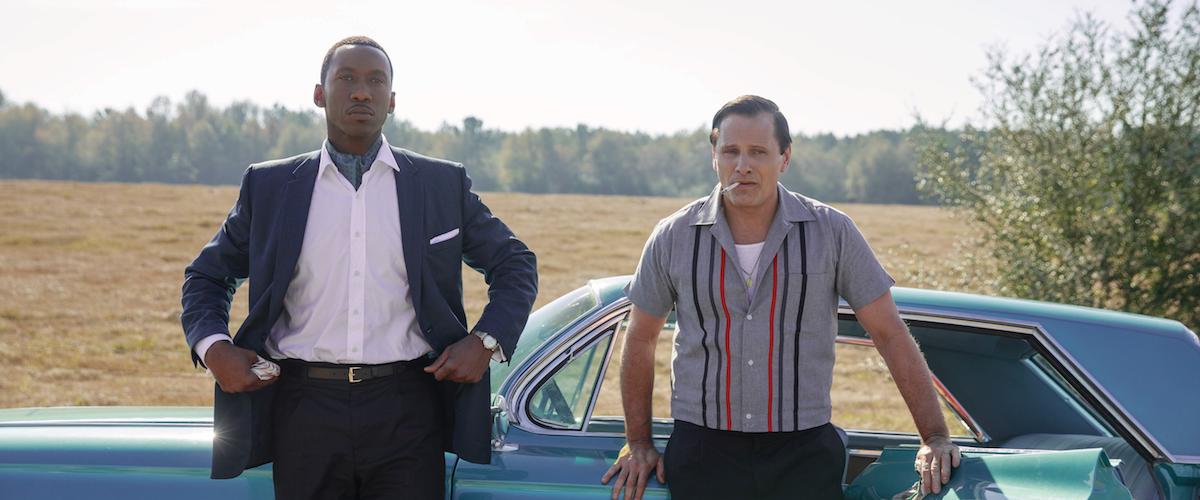
It’s pure formula, of course. Two men—one white, one black—from polar opposite backgrounds with wildly contrasting personalities get thrown together under unusual circumstances. They learn from each other, change each other for the better and discover that—guess what?—they’re not so different after all.
“Green Book” is all that and more: It also takes place while the two men are driving across the American South during 1962, so it contains multiple formulas at once. It’s the mismatched-buddy road trip movie with a message about race relations, arriving in theaters at the height of awards season and the holidays, just in time to make us all feel better about the world—or at least give us a brief glimmer of hope during this period of political and ideological division. As an added bonus, it also happens to have been inspired by a true story.
But damned if it doesn’t work beautifully for nearly the entirety of its two hour-plus running time. “Green Book” is the kind of old-fashioned filmmaking big studios just don’t offer anymore. It’s glossy and zippy, gliding along the surface of deeply emotional, complex issues while dipping down into them just enough to give us a taste of some actual substance.
And its enjoyability comes almost completely from its starring performances from an excellent Viggo Mortensen and Mahershala Ali . Both actors imbue their roles with precision and pathos. They find nuance within their familiar types individually and share a spirited chemistry with each other. They are a joy to watch together from start to finish, even though you can tell from the beginning exactly how specific moments between them are going to play out by the end.
You may be surprised to learn that this conventional piece of classy, inspirational filmmaking comes from director and co-writer Peter Farrelly , a longtime standard bearer of lowbrow comedy alongside his brother, Bobby. It’s a rare opportunity for him to direct solo, and it may seem like a departure. But the Farrellys’ woefully underappreciated bowling comedy “ Kingpin ” features quite a few of the same sorts of opposites-on-a-road-trip themes, as well as the possibility for unexpected friendship. An underlying sweetness—and the need to be decent to others—quite frequently exists beneath the gross-out gags and bodily fluids that have been the brothers’ bread and butter for decades. And that’s certainly at the heart of “Green Book.”
In a racial flip of “ Driving Miss Daisy ,” nearly 30 years after that film won a handful of Oscars including best picture, “Green Book” features a white man serving as a chauffeur—and valet, and muscle, and all-around problem solver—to a black man. (That’s not to say the film is entirely free of icky white savior moments, but it does offer instances of Ali’s character rescuing Mortensen’s, as well.) The title comes from the travel guide of restaurants and motels blacks were allowed to frequent in the segregated South.
Mortensen’s chameleon-like abilities are on display here once more as he disappears into the role of Tony Vallelonga—or “Tony Lip,” as he’s best known among his fellow Italian-Americans in New York. (Tony’s son, Nick, co-wrote the vivid and affectionate script with Farrelly and Brian Hayes Currie .) A brash and affable lug of a guy with big appetites and an even bigger loyalty to his wife (a lovely Linda Cardellini ) and two young sons, Tony is content staying in the same section of the Bronx where he’s always lived. An ever-present cigarette dangles from his mouth as he mangles the English language. Working as a bouncer at the Copacabana nightclub and gambling here and there for extra cash, he remains just enough on the periphery of the mob to keep himself out of real danger. (In an early moment indicating his sense of right and wrong, he’d rather pawn his watch to make ends meet before Christmas than do a job for some fellas for easy money.)
But then, the possibility of employment comes his way that would allow him to provide real financial stability for his family, even though it would take him away from them for a couple of months. Ali’s Dr. Don Shirley, a world-class pianist, needs someone to drive him on a tour of cities across the Eastern Seaboard and the South, where he’ll perform in both concert halls and private homes. Shirley—or “ Doc ,” as Tony calls him—is everything Tony is not: educated, sophisticated, articulate, meticulous. And black. Tony may be a good guy, but he’s got some antiquated, misinformed ideas about African-Americans and more than a tinge of racism against them, as evidenced by his early reaction to a couple of plumbers working in his home. Clearly, all that is about to change.
Ali brings an elegance to the role but also a moving vulnerability. When we first see him in his ornately appointed apartment above Carnegie Hall, where he’s dressed in robes and jewels and he’s literally sitting on a throne above Tony to interview him for the job, it’s easy to assume he’s simply going to be condescending and persnickety. But Doc reveals shadings and complexity as the road trip progresses, and he hints at the inner torment that’s driven him to build a refined outer shell.
The main pleasure of “Green Book” comes from watching Tony and Doc banter as they make their way from town to town—trading small talk, getting to know each other and getting on each others’ nerves. Their distinct opinions on fried chicken and Little Richard , for example, defy traditional stereotypes. Quite often, their burgeoning friendship plays out exactly the way you expect it will. When Tony’s wife asks him to write her letters from the road, and he demurs out of embarrassment, you know it’s only a matter of time before Doc is helping him craft eloquent, romantic missives to send her.
But other scenes offer some surprises in the details through which they’re executed. This is especially true in the powerful piano performances (achieved with the help of a body double, although Ali’s graceful demeanor is convincing). They indicate the transformation occurring between the two men as well if not better than their dialogue, especially during the final show of the trip, where many of the movie’s ideas about race and identity wrap up in joyous, satisfying fashion. You may actually find yourself getting a bit choked up by the end, even though you’ve been on this journey countless times before.


Christy Lemire
Christy Lemire is a longtime film critic who has written for RogerEbert.com since 2013. Before that, she was the film critic for The Associated Press for nearly 15 years and co-hosted the public television series “Ebert Presents At the Movies” opposite Ignatiy Vishnevetsky, with Roger Ebert serving as managing editor. Read her answers to our Movie Love Questionnaire here .
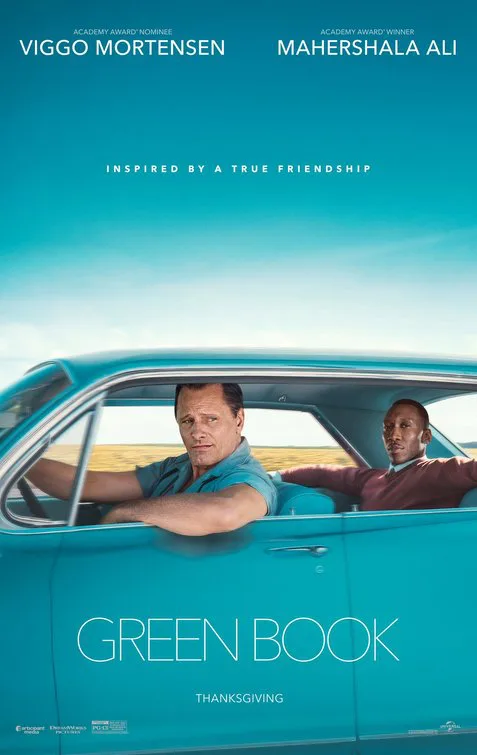
- Joe Cortese as Joey Loscudo
- Brian Stepanek as Graham Kindell
- Viggo Mortensen as Tony Lip
- Tom Virtue as Morgan Anderson
- Linda Cardellini as Dolores
- Mahershala Ali as Don Shirley
- Sebastian Maniscalco as Johnny Venere
- Don Stark as Jules Podell
- Brian Hayes Currie
- Nick Vallelonga
- Peter Farrelly
- Kris Bowers
- Patrick J. Don Vito
Cinematographer
- Sean Porter
Leave a comment
Now playing.
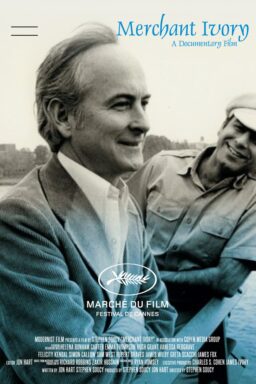
Merchant Ivory
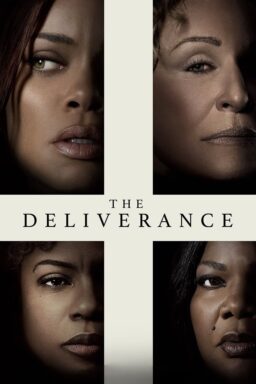
The Deliverance
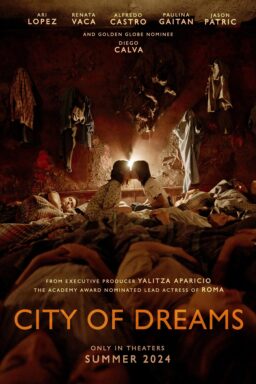
City of Dreams

Out Come the Wolves

Seeking Mavis Beacon
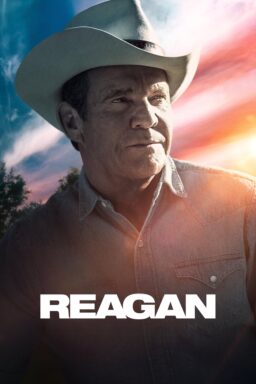
Across the River and Into the Trees
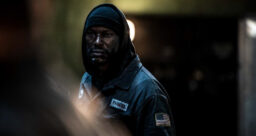
You Gotta Believe
Latest articles.

“Risky Business” Remains One of the Most Daring Films of the ’80s

Venice Film Festival 2024: Separated, Maria, Kill the Jockey, One to One: John & Yoko

Experience the Star Trek Movies in 70mm at Out of this World L.A. Event

Home Entertainment Guide: August 2024
The best movie reviews, in your inbox.
Advertisement
Supported by
‘Green Book’ Review: A Road Trip Through a Land of Racial Clichés
- Share full article
‘Green Book’ | Anatomy of a Scene
Peter farrelly narrates a sequence from his film featuring viggo mortensen and mahershala ali..
“Hi. I’m Pete Farrelly, co-writer and director of “Green Book.” “Green Book” is the story of Don Shirley, a concert pianist played by Mahershala Ali, who, in 1962, had to go on a tour of the south. He hired a bouncer, Tony Lip, played by Viggo Mortensen here, to drive him. This is a scene early on in the movie when they stopped to get a pack of cigarettes. And Tony Lip gets out, finds a jade stone on the ground, but it’s next to where they’re selling gemstones. Obviously somebody dropped it there. He puts it in his pocket. Thinks, well, it’s on the ground. I can have it. And is accused of stealing it by the other band members. The point of this scene is — it’s a true story, by the way — that it’s something that Tony Lip told us — we had audiotapes of Tony Lip telling stories about Dr. Shirley trying to teach him. He said, you know, I love that man — Dr. Shirley — and the reason I do is because he was always trying to make me smart.” “Before we pull out, Tony, we need to have a talk.” “Eh?” “Oleg told me what you did.” “What’d I do?” “You stole a jade stone from the store.” “No, I didn’t.” “He watched you do it.” “I didn’t steal no stone.” “You picked it up and put it in your pocket.” “I picked up a rock off o’ the ground. I didn’t steal from a box.” “Now, why would you pick up a rock off the ground?” “I don’t know. Because it ain’t stealing. It’s just a regular rock.” “And why would you want a regular rock?” “To have. For luck, maybe.” “A lucky rock?” “Yeah.” “Let me see it.” “The thing that really comes through here is a parent-child relationship is forming. Dr. Shirley is educated. Tony Lip’s — sixth grade education, but really didn’t pay attention after third grade.” “Take it back and pay for it.” “And he’s being schooled by Dr. Shirley. Dr. Shirley — if he’s gonna be spending a couple of months with him, he’s trying to help him in the way he talks, the way he speaks, the way he treats people, the way he acts.” “Do not drive, Mr. Vallelonga.” “It helps that Dr. Shirley’s in control when he doesn’t get out. He doesn’t do anything. He sits there. And Tony has to turn to him, and Tony has to stretch around him, and he’s just such a child in this scene, the way he reacts to everything. It’s like if you caught a five-year-old stealing gum at the grocery store. That’s how he reacts. I liked Viggo having to turn toward him, and it just felt like he was at a disadvantage in that scene. And it helped empower Dr. Shirley that he could just sit back and control it.” “If you’d like, Tony, I’d happily buy you the stone.” “Don’t bother. You took all the fun out of it.”

By A.O. Scott
- Nov. 15, 2018
“Green Book” is a road movie set in 1962, long before Apple or Google Maps or Waze, but as it makes its way from New York to Alabama and back, you might nonetheless imagine a little GPS voice in your ear telling you what’s up ahead.
There is virtually no milestone in this tale of interracial male friendship that you won’t see coming from a long way off, including scenes that seem too corny or misguided for any movie in its right mind to contemplate. “Siri, please tell me they’re not going there.” Oh, but they are.
“There” includes an entire subplot devoted to fried chicken, which the African-American member of the buddy duo has never eaten. He eventually (spoiler alert) acquires a taste, thanks in part to the urgings of his white counterpart.
The crispy poultry motif figures heavily in the “Green Book” trailers, conceivably as a warning. Every suspicion you might entertain — that this will be a sentimental tale of prejudices overcome and common humanity affirmed; that its politics will be as gently middle-of-the-road as its humor; that it will invite a measure of self-congratulation about how far we, as a nation, have come — will be confirmed.
Because the white guy, an erstwhile nightclub bouncer named Frank Anthony Vallelonga and known as Tony Lip (Viggo Mortensen), is behind the wheel of a car while the black guy, the pianist and composer Don Shirley (Mahershala Ali), rides in back, “Green Book” seems to invite comparison to “Driving Miss Daisy.” But its pedigree is slightly different, reaching back through the Gene Wilder-Richard Pryor comedies of the 1970s to “The Defiant Ones” in 1958, which starred Sidney Poitier and Tony Curtis as runaway convicts in the Jim Crow South.

We are having trouble retrieving the article content.
Please enable JavaScript in your browser settings.
Thank you for your patience while we verify access. If you are in Reader mode please exit and log into your Times account, or subscribe for all of The Times.
Thank you for your patience while we verify access.
Already a subscriber? Log in .
Want all of The Times? Subscribe .
Screen Rant
Green book review: driving dr. shirley.

Your changes have been saved
Email is sent
Email has already been sent
Please verify your email address.
You’ve reached your account maximum for followed topics.
The Crow 2024 Box Office Finally Passes Global Milestone After Lackluster Opening Weekend
A 62-minute horror movie with $800 budget is going viral & it might be one of the best of 2024, stephen king-defended 2024 horror movie becomes streaming success, green book is a delightful and inspiring story fueled by terrific performances by its leads, a sharp screenplay, and deft direction..
Premiering at the 2018 Toronto International Film Festival (where it took home the coveted 2018 People's Choice Award), Green Book emerged as one of this year's leading and surprising Oscar contenders. The film is the latest work by director Peter Farrelly, best known as one half of the Farrelly brothers duo behind comedy hits like Dumb and Dumber and There's Something About Mary . Here, he makes the leap to different territory, chronicling a real-life friendship that blossomed during a tumultuous time for America. There might have been some fear that Farrelly would be out of his element, but that couldn't be further from the case. Green Book is a delightful and inspiring story fueled by terrific performances by its leads, a sharp screenplay, and deft direction.
Green Book is set in 1962, picking up as working class Italian-American Tony "Lip" Vallelonga (Viggo Mortensen) finds himself needing new work after the Copacabana closes for two months due to renovations. As he looks around for a job to support his wife Dolores (Linda Cardellini) and two kids, Tony interviews for a driving position with Dr. Don Shirley (Mahershala Ali). Shirley, an African-American classical pianist, is set to tour the deep South and needs an associate to not only transport him to concert venues, but also act as security if any issues arise.
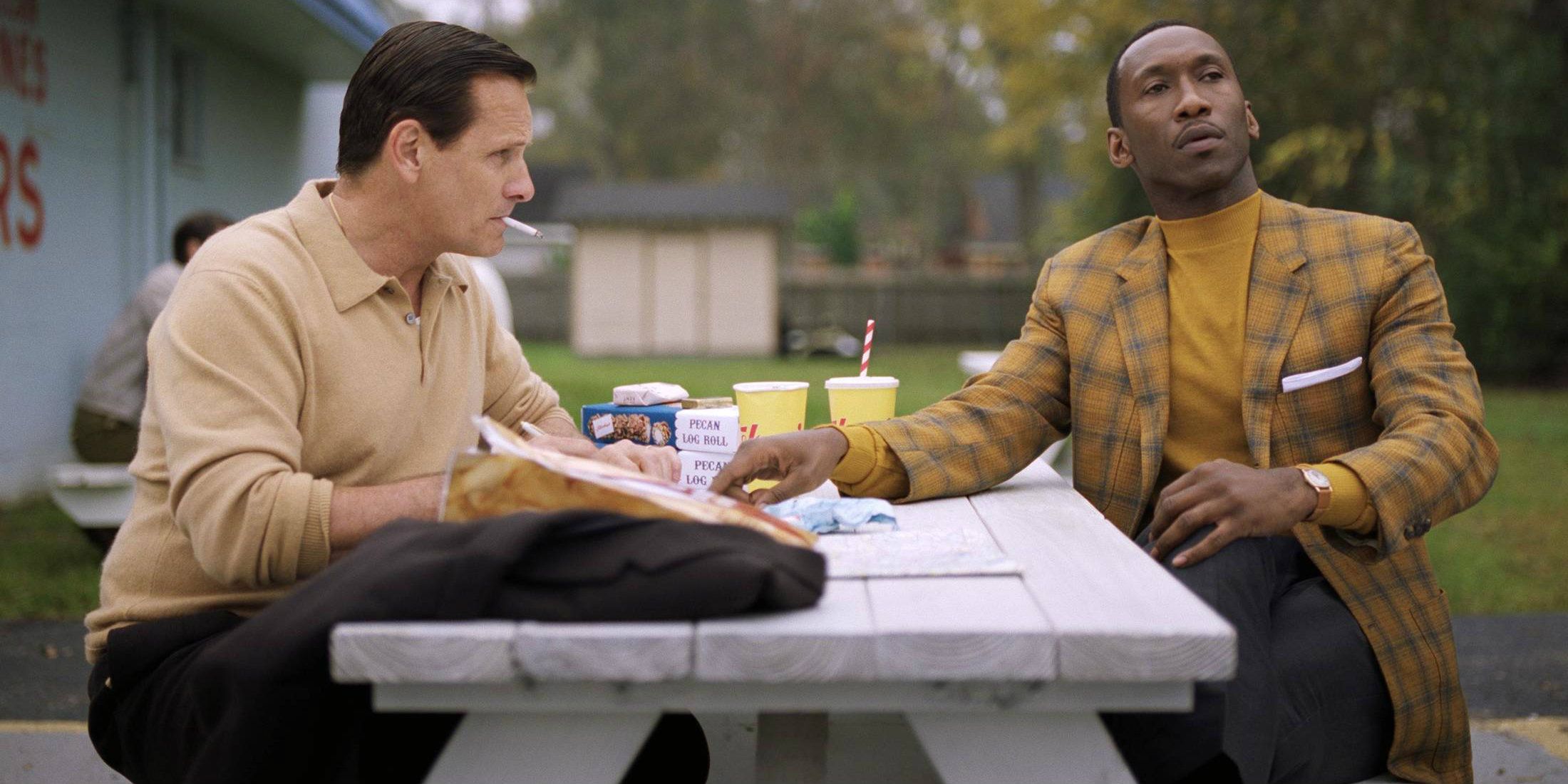
Even though the job will keep Tony away from his family for eight long weeks, the nice payday encourages him to take it. Promising Dolores he'll be home for Christmas, Tony hits the road with Dr. Shirley and the other two members of Shirley's musical trio, using the Negro Motorist Green Book as a guide to find colored-friendly establishments at the various tour stops. Vallelonga and Shirley will have to work hard to overcome their personal differences and the injustices they'll face along the way. But it could be a very rewarding experience for both men, changing their lives for the better in more ways than one.
After its run at the festival circuit, Green Book drew several comparisons to Best Picture winner Driving Miss Daisy , leading some viewers to find it a bit safe and conventional in its storytelling and themes. There's no denying audiences should be able to plot out the narrative's trajectory in their heads, but that doesn't diminish the journey in the slightest. Tony Lip's son Nick Vallelonga is one of three credited co-writers (along with Farrelly and Brian Hayes Currie), which helps the film find its crucial sense of authenticity. While Nick didn't accompany his father and Shirley on the tour, the script no doubt takes inspiration from Tony's stories about his time in the South. The writing team deserves credit for blending comedy and drama, as Green Book is never short on levity, yet still shines a spotlight on the rather serious and frustrating racial prejudices that were so prevalent in the segregation era. A number of clever callbacks and payoffs peppered throughout the script also ensure no scene goes to waste, as the film cruises through its runtime.

Farrelly specializes in gross-out humor that doesn't work for everyone, but he shows a refreshing constraint here, handling potentially sensitive subject matter with the grace and care it deserves. He tones down his usual sensibilities, with all of the comedy feeling natural and in-character. Collaborating with production designer Tim Galvin and cinematographer Sean Porter, the director also takes moviegoers straight back to the 1960s, drawing viewers in with its tone and aesthetic from the opening minutes. Farrelly definitely borrows from the Martin Scorsese playbook in places (the presence of the Copacabana will bring Goodfellas to mind), employing a catchy soundtrack full of old school pop tunes to complement Shirley's virtuoso piano performances. But his approach doesn't come across as derivative, instead adding to the already captivating atmosphere.
For all the strong work by Farrelly and his crew, it's hard to imagine Green Book working as well as it does without the presence of Mortensen and Ali. The two actors are a perfectly matched pair, playing off each other with great chemistry. Mortensen arguably has the showier role of the two, completely transforming into the larger-than-life figure of Tony Lip. After putting together a string of more serious-minded turns, it's nice to see the actor loosen up and have some fun as the street-wise bouncer. In a lesser thespian's hands, Tony Lip may have become a caricature, but Mortensen maintains Vallelonga's humanity throughout. Ali gives a reserved and soulful performance as Shirley, tapping into the character's inner turmoil of being a person torn between two worlds. He gives off a fittingly regal and sophisticated aura, but also has convincing dramatic outbursts to make it a well-rounded portrayal. Both leads have rightfully been in discussion for Oscar nominations and definitely deserve them.
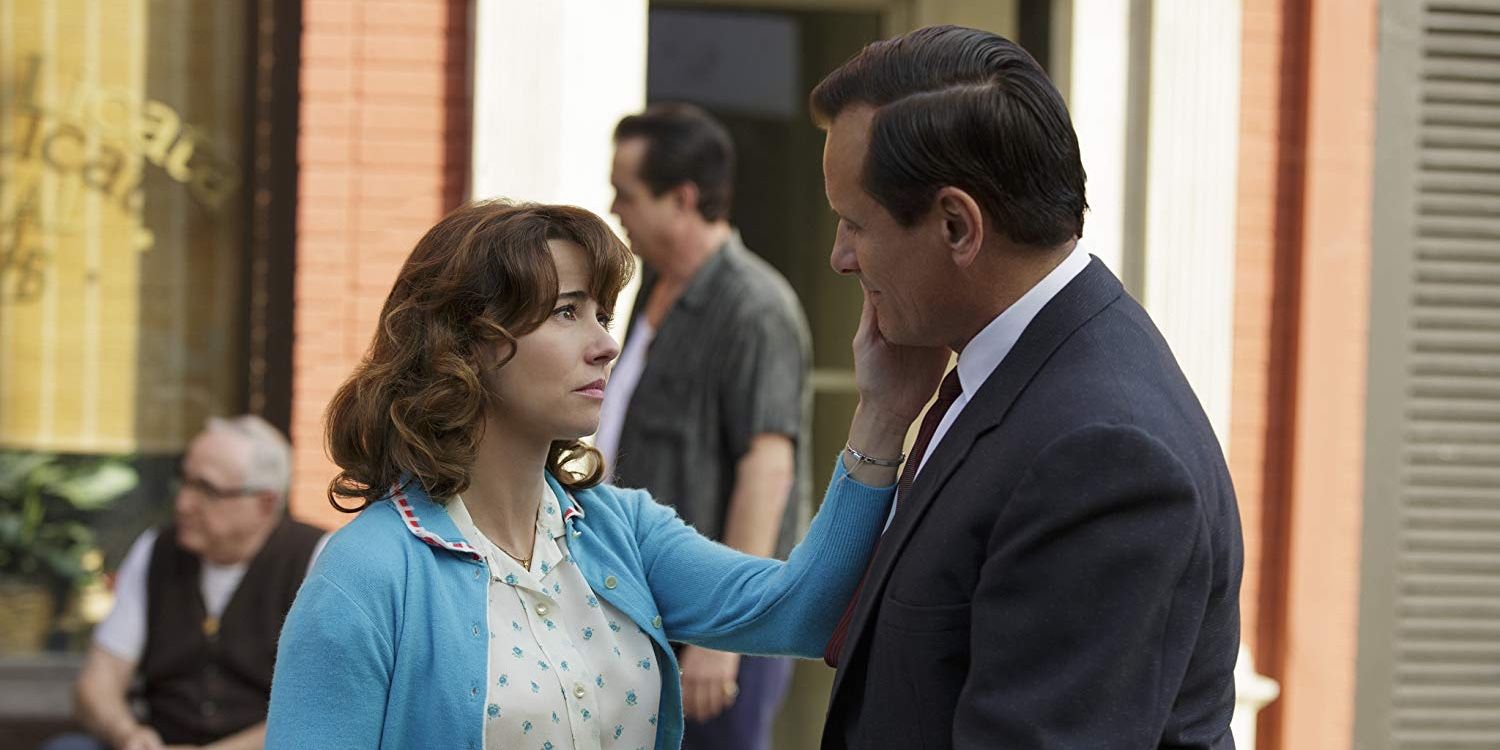
With so much of the focus on Tony Lip and Dr. Shirley's dynamic, the supporting cast unfortunately gets lost in the background. Farrelly populates New York with other members of the Vallelonga family, and while they deliver a solid laugh or two during brief interludes in the second act, they aren't given much to work with. Even Cardellini (who makes the most of her short screen time) amounts to little more than the housewife missing her loving husband. To be fair, this is most likely a byproduct of the story's nature, rather than negligence on the part of the creative team. The crux of Green Book's plot doesn't lend itself to being an ensemble piece, but it should be noted none of the actors are bad in their roles. They all do what's necessary, filling out the world Farrelly created. The lone exception is Dimiter D. Marinov as Oleg, a member of Shirley's trio, who has a few interactions with Tony Lip that hammer home some vital life lessons.
Green Book may not be as artistically daring or ambitious as some of 2018's other awards contenders, but it definitely lives up to the buzz and should be in the running for several major Oscars. The movie works on all fronts across the board, and its heartwarming story makes it the perfect film to catch over the Thanksgiving holiday. It could even be seen as the ideal antidote to today's divisive and trying times, depicting a touching tale of two people from wildly different backgrounds coming together and forging a lifelong bond. For cinephiles looking to keep up on the year's best as awards season heats up, Green Book is worth seeing in theaters.
Green Book is now playing in U.S. theaters. It runs 130 minutes and is rated PG-13 for thematic content, language including racial epithets, smoking, some violence, and suggestive material.
Let us know what you thought of the film in the comments!
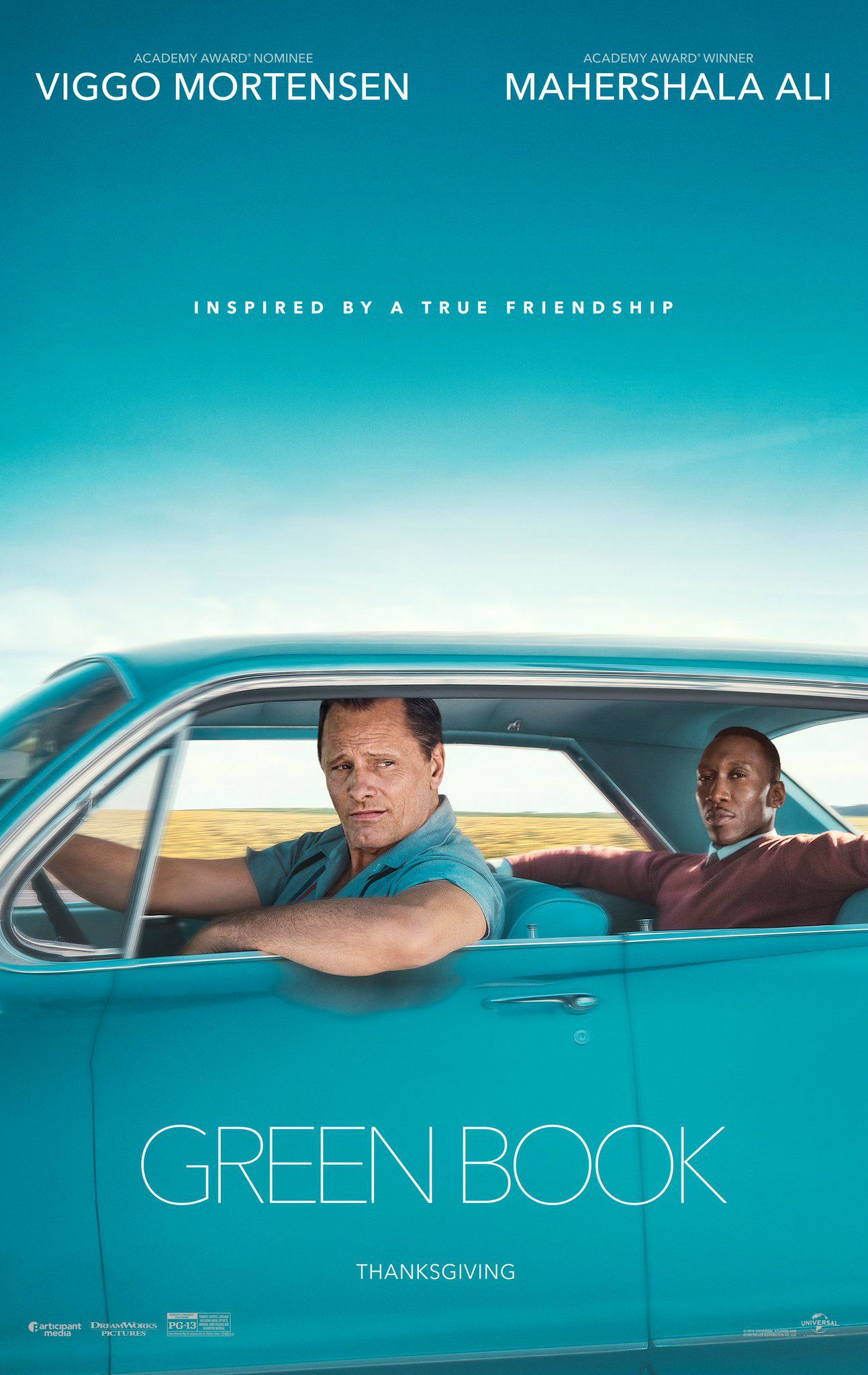
Green Book is an Oscar-winning road movie starring Viggo Mortensen and Mahershala Ali as Italian American bouncer Tony Lip and pianist prodigy Dr. Don Shirley, respectively. They form an unlikely friendship in the face of the all-pervasive racism and homophobia of the Deep South in the 1960s. The 2018 film is inspired by true events and its title comes from a real-life guidebook made for Black travelers.
- Movie Reviews
- 4 star movies
Log in or sign up for Rotten Tomatoes
Trouble logging in?
By continuing, you agree to the Privacy Policy and the Terms and Policies , and to receive email from the Fandango Media Brands .
By creating an account, you agree to the Privacy Policy and the Terms and Policies , and to receive email from Rotten Tomatoes and to receive email from the Fandango Media Brands .
By creating an account, you agree to the Privacy Policy and the Terms and Policies , and to receive email from Rotten Tomatoes.
Email not verified
Let's keep in touch.

Sign up for the Rotten Tomatoes newsletter to get weekly updates on:
- Upcoming Movies and TV shows
- Rotten Tomatoes Podcast
- Media News + More
By clicking "Sign Me Up," you are agreeing to receive occasional emails and communications from Fandango Media (Fandango, Vudu, and Rotten Tomatoes) and consenting to Fandango's Privacy Policy and Terms and Policies . Please allow 10 business days for your account to reflect your preferences.
OK, got it!
- About Rotten Tomatoes®
- Login/signup
Movies in theaters
- Opening This Week
- Top Box Office
- Coming Soon to Theaters
- Certified Fresh Movies
Movies at Home
- Fandango at Home
- Prime Video
- Most Popular Streaming Movies
- What to Watch New
Certified fresh picks
- 73% Blink Twice Link to Blink Twice
- 96% Strange Darling Link to Strange Darling
- 86% Between the Temples Link to Between the Temples
New TV Tonight
- 100% Slow Horses: Season 4
- 94% English Teacher: Season 1
- -- The Perfect Couple: Season 1
- -- Tell Me Lies: Season 2
- -- Fight Night: The Million Dollar Heist: Season 1
- -- Wise Guy: David Chase and The Sopranos: Season 1
- -- The Secret Lives of Mormon Wives: Season 1
- -- Whose Line Is It Anyway?: Season 14
Most Popular TV on RT
- 70% Kaos: Season 1
- 86% The Lord of the Rings: The Rings of Power: Season 2
- 95% Terminator Zero: Season 1
- 100% Dark Winds: Season 2
- 92% Bad Monkey: Season 1
- 78% Star Wars: The Acolyte: Season 1
- 100% Pachinko: Season 2
- 96% Only Murders in the Building: Season 4
- Best TV Shows
- Most Popular TV
Certified fresh pick
- 86% The Lord of the Rings: The Rings of Power: Season 2 Link to The Lord of the Rings: The Rings of Power: Season 2
- All-Time Lists
- Binge Guide
- Comics on TV
- Five Favorite Films
- Video Interviews
- Weekend Box Office
- Weekly Ketchup
- What to Watch
The Best Shows on Amazon Prime Video to Watch Right Now (August 2024)
100 Best Netflix Series To Watch Right Now (August 2024)
What to Watch: In Theaters and On Streaming
Awards Tour
Beetlejuice Beetlejuice First Reviews: Michael Keaton’s Return as Betelgeuse is Worth the Wait
13 Must-Watch Films at the 2024 Toronto International Film Festival
- Trending on RT
- Beetlejuice Beetlejuice
- TV Premiere Dates
- Venice Film Festival
- Renewed and Cancelled TV
Green Book Reviews
The more you think about it in retrospect, [...] the more chances you have of getting madder. (Or it will probably make you feel better about being utterly ignorant about systemic racism; you choose.)
Full Review | Original Score: 2.5/5 | Jul 9, 2024
The score and editing are not memorable at all, with some scenes just feeling out of place, and a soundtrack that feels too on the nose at times.
Full Review | Original Score: C- | Apr 4, 2024
Green Book tells the story of the friendship between the renowned pianist and composer Don Shirley, and his driver and bodyguard Tony “Lip” Vallelonga in the sixties. The different cultures and social classes will be the main focus of the action.
Full Review | Original Score: 8/10 | Jan 27, 2024
An enjoyable buddy flick with strong performances from Mahershala Ali and Viggo Mortensen, it’s a shame the plot ends up being so passé – as well intentioned and entertaining as it is.
Full Review | Jun 27, 2023

Despite good intentions, a promising scenario and fine performances, “Green Book” is the latest version of Hollywood’s “Great White Savior” movie.
Full Review | Dec 7, 2022
The biggest strength lies in the chemistry between Mortensen and Ali. Without it the entire movie would fall apart.
Full Review | Original Score: 3.5/5 | Aug 21, 2022
Green Book is not for the cold-hearted cynic, but for the romantic moviegoer who wants nothing more than to see the good in people and let that feeling wash over them.
Full Review | Original Score: 4/5 | Aug 17, 2022
Tears will be shed, laughs will be had, and crowds will love it. The viewer might not always feel good about how those reactions are achieved; despite the overwhelming feel-goodness of the experience, you can see Green Book's gears operating.
Full Review | Original Score: 3/4 | Mar 8, 2022
This is a deftly scripted comedy with a message. Anchored by two outstanding performances, this true story of an unlikely friendship will warm even the most jaded of hearts with its comic look on a dark chapter of American history.
Full Review | Original Score: 4/5 | Sep 1, 2021
It's irresponsible and dismissive of the very thing it seemingly wants to talk about.
Full Review | Original Score: 2. 5 / 5 | Jun 25, 2021
With so many other recent movies finding a way to address racial issues in both entertaining and considerate methods, Green Book feels like a wrongheaded throwback. It may give you some good feelings, but its message is only half-baked.
Full Review | Apr 29, 2021
For its humanistic, anti-racialist message-the elementary notion that white and black people can get along-Green Book has been well received by audiences.
Full Review | Feb 17, 2021
Probably could have hit a little harder but its message of unity, of creating bridges rather than walls, is a welcome one in these politically divisive times.
Full Review | Original Score: 4/5 | Feb 3, 2021
The two leads are quite impressive, managing to overcome the limitations of their largely stock roles.
Full Review | Original Score: 7/10 | Dec 6, 2020
It's a movie about racism by whites for whites and in a year full of extraordinary films about race by black filmmakers, Green Book sticks out like a sore thumb partially because of that.
Full Review | Oct 2, 2020
it's light and breezy and matter-of-fact and truly, truly entertaining.
Full Review | Original Score: 3.5/4.0 | Sep 9, 2020
Mahershala Ali and Viggo Mortensen are a match made in heaven. In its political correctness, it finds moments of truth. [Full review in Spanish]
Full Review | Original Score: 8/10 | Sep 2, 2020
"Green Book" is one of those rare crowd pleasers with the chops to go the Oscar distance. It's a film most easily described as a reverse "Driving Miss Daisy" (1989) when really it's so much more than that.
Full Review | Original Score: 4/4 | Aug 29, 2020
For the most part it's solid, even though it's about as subtle as a piano falling down a flight of stairs.
Full Review | Original Score: 3/5 | Aug 16, 2020
Ali is stuck trying to breathe life into a cardboard cutout of a real person who . . . is left standing like an uncooked noodle who only curdles when the script lets him.
Full Review | Original Score: 2/5 | Jul 25, 2020
Green Book (2018)
- User Reviews
Awards | FAQ | User Ratings | External Reviews | Metacritic Reviews
- User Ratings
- External Reviews
- Metacritic Reviews
- Full Cast and Crew
- Release Dates
- Official Sites
- Company Credits
- Filming & Production
- Technical Specs
- Plot Summary
- Plot Keywords
- Parents Guide
Did You Know?
- Crazy Credits
- Alternate Versions
- Connections
- Soundtracks
Photo & Video
- Photo Gallery
- Trailers and Videos
Related Items
- External Sites
Related lists from IMDb users

Recently Viewed
We need your support today
Independent journalism is more important than ever. Vox is here to explain this unprecedented election cycle and help you understand the larger stakes. We will break down where the candidates stand on major issues, from economic policy to immigration, foreign policy, criminal justice, and abortion. We’ll answer your biggest questions, and we’ll explain what matters — and why. This timely and essential task, however, is expensive to produce.
We rely on readers like you to fund our journalism. Will you support our work and become a Vox Member today?
- Awards Shows
Green Book builds a feel-good comedy atop an artifact of shameful segregation. Yikes.
The movie is named after guides published for black travelers in segregated America. But its spin is all Hollywood.
by Alissa Wilkinson

Green Book took home three Golden Globe Awards on Sunday for Best Comedy, Best Screenplay, and supporting actor Mahershala Ali — and that’s hardly a surprise. A period piece that’s also a road trip movie and a buddy dramedy? Based on a true story? With two strong performances and a heartwarming message about overcoming prejudice? That ends at a Christmas celebration? Sign America up (or at least the Hollywood Foreign Press Association).
The film, directed by comedy veteran Peter Farrelly , stars Viggo Mortensen and Ali. It’s “inspired” by the true friendship of Tony Vallelonga, an Italian-American chauffeur/bodyguard from the Bronx, and Don Shirley, the black pianist Vallelonga is hired to drive and protect on a concert tour through the deep South in 1962. It’s often funny, with some poignant moments and a heart that feels like it’s in the right place.
Yet curiously, the Green Book itself doesn’t play much of a role in the film. Mortensen’s character, Tony, takes it on the trip and leafs through it several times. Early on, he briefly explains its purpose to his wife Delores (Linda Cardellini): to provide black travelers with information about “safe” places to stay and to eat while they travel. He’ll need to refer to it to do his job, getting Shirley from gig to gig safely throughout the musician’s eight-week tour.

But after that, the book is not mentioned by name, even as the pair encounter the full gamut of racism during the trip — ranging from casual remarks to “genteel” discrimination to violent hostility from civilians, bar patrons, and police. Indeed, we typically see it only when Tony quietly picks it up to find motels in which Shirley can safely stay.
When Farrelly took the stage to accept the Golden Globe for Best Comedy or Musical, he used the opportunity to reiterate the film’s themes (and demand that the orchestra not play him off):
Green Book is a story of a trip that — [ to the orchestra ] please, no, turn that off. No, go away. Off. Okay. This is a story of the trip that Don Shirley took in the pre-Civil Rights era of the 1960s. Don Shirley was a great man and underappreciated genius who couldn’t play the music he wanted to play, simply because of the color of his skin. Yet he went on to create his own music that still resonates to this day. ... This story, when I heard it, gave me hope, and I wanted to share this hope with you. Because we are still living in divided times, and that’s what this movie is for: It’s for everybody. If they can find common ground here, we all can. All we have to do is talk and to not judge people by their differences, but look for what we have in common. And we have a lot in common. We all want the same thing: We want love and happiness and want to be treated equally. And that’s not a bad thing.
Farrelly’s speech is of a piece with the film’s approach to racism, common to Hollywood films, which is to suggest that relationships between individuals will heal centuries of racism. And indeed, Green Book ’s treatment of racism is uneven at best. In an early scene, for instance, Tony throws away two drinking glasses that black construction workers used in his kitchen, suggesting he draws a hard line about even coming into contact with black people. But a movie like this needs a “likable” hero, and after that moment, he doesn’t engage in such blatantly offensive behavior for the rest of the film. As an Italian American, Tony would have experienced plenty of discrimination himself, but the film only hints at it.
But even setting aside the characters’ development, for a movie named Green Book , it’s light on details about the actual, well, Green Book. It also seems to imply that such a guide was only really necessary in the Deep South, which rang false to me. Watching it, I worried that the screenplay — written by Farrelly, Brian Hayes Currie, and the real-life Tony’s son, Nick Vallelonga, who clearly drew on his father’s remembrance of the trip — might have glossed over the reality experienced by black Americans like Shirley.
But before seeing the movie, I didn’t know much about the Green Book itself, so I dug into its history to learn more. What I learned helped me see the ways in which Green Book doesn’t go nearly far enough in confronting its subject, and winds up trivializing serious matters as a result.
Here are four things I learned about the Green Book, and what it says about Green Book .
If you were a black American in the middle of the 20th century, you almost certainly knew about the Green Book
For middle-class Americans in the 1930s, the newfound availability of safe, affordable automobiles was not just a matter of convenience. It meant new possibilities, the ability to travel around the country at their leisure, without relying on anyone else. That was also true for African Americans, even in a country that was legally segregated in some places and functionally segregated virtually everywhere else.
But while white travelers could move with relative freedom, stopping into restaurants, bars, entertainment establishments, and places of lodging as they pleased, road travel was more fraught for African Americans. Staying in the wrong hotel, or trying to eat at the wrong establishment, could get you kicked out or much worse.
The Negro Motorist Green Book wasn’t the only travel book aimed at black motorists in America, but it was the most popular. It was created by Victor Hugo Green, an African-American mail carrier who lived in Harlem and worked in nearby Hackensack, New Jersey. Green worked on the project for three decades, from 1936 to 1966, shortly after the Civil Rights Act was signed into law, with a break during World War II for about four years. The Green Book swiftly became the most vital document for black travelers in America, detailing places where they could eat, drink, and spend the night without being harassed or worse.
Twenty-two editions of the Green Book (and one supplement), published from 1937 to 1966, have since been collected and digitized by the Schomburg Center for Research in Black Culture at the New York Public Library. “From what I can tell, [Green] had a car, he was very interested in cars, and he decided to create a travel guide that helped black travelers, or black motorists, be able to take advantage of the newfound freedom of having a car,” Maira Liriano, the chief librarian and curator of the center’s Green Book collection, told me.

The Green Books were mostly devoted to options for lodging and dining, but they contained other information too. “There were listings for rest stops, restaurants, barber shops, beauty shops,” Liriano says. And in some towns, especially smaller ones, no hotel would offer lodging to black people. For many of those, the Green Book listed “tourist homes,” which Liriano describes as “sort of like a precursor to Airbnb.” Black homeowners, mostly in the South, would rent a room in their home to black travelers looking for somewhere to spend the night.
That was especially important in so-called “sundown towns,” which passed laws designed to drive black people out of town that prohibited them from being on the road at night. One such town is depicted in Green Book .
Sundown towns weren’t specifically mentioned in the Green Book. But there were about 10,000 sundown towns in the US as late as the 1960s, and not just in the South : Levittown, New York; Glendale, California; and most Illinois municipalities were among their number. And while it could be dangerous to be on the road at night, it could be equally dangerous to check into the wrong hotel. In an age where you couldn’t just whip out your phone and look up Yelp reviews — and in which you could literally risk your life by being in the wrong part of town with the wrong skin color — you needed a guide.
So if you were traveling while black, you knew about the Green Book, because you had to, for your own safety. In his 2000 memoir A Colored Man’s Journey through 20th Century Segregated America , Earl Hutchinson Sr. (believed to be the oldest black American to publish a memoir, at age 96), wrote that “the Green Book was the bible of every Negro highway traveler in the 1950s and the early 1960s. You literally didn’t dare leave home without it.”
In the film, Shirley never mentions or even looks at the Green Book — only Tony interacts with it. In fact, the Shirley character in the film seems to have consciously distanced himself from many elements of black culture, while remaining richly aware of the discrimination he will encounter on the trip. But in real life, Shirley had previously traveled throughout the country before embarking on his tour with Tony, and would almost certainly have known all about the Green Book. It simply wouldn’t have been safe not to.
The Green Book was necessary no matter which part of the country you were traveling through
Green Book depicts a range of ways in which the racist attitudes that were dominant in American life in the early and mid-20th century manifested themselves, from snide comments and racial epithets to outright hostility. But it strongly suggests that a guide like the Green Book was only really necessary in the Deep South, where under Jim Crow laws, segregation was not just encouraged, but legally enforced.
The first time Tony consults the Green Book comes after several stops on Shirley’s concert tour, in Ohio and Indiana. Once they cross into Kentucky, the Green Book becomes his guide, and we see it in his hands and on the car seat beside him several times. And a key scene near the end of Green Book suggests that while Shirley was harassed and worse by police in the South, once they returned north of the Mason-Dixon line, he was safe from that experience.
But the reality was different.
Victor Green himself lived in Harlem, a predominantly black neighborhood in New York City, and his first Green Book covered mostly the New York metropolitan area. “It was very much a local guide that listed auto repair shops, but also places in the suburbs, like nightclubs and restaurants,” Liriano told me. “It was highlighting businesses that were friendly and open, and that would be of interest, to the African American motorist.”
But interest in the book was high, and subsequent editions expanded very rapidly. “In two years, they included pretty much the whole country,” Liriano said.
That meant the Green Book didn’t restrict its listings to places like Georgia and Alabama, or other states with explicit Jim Crow laws — it was a lifeline for travelers virtually anywhere in the country.

In the 1962 edition of the Green Book , published the year in which Green Book is set, you can find listings for restaurants in Wilmington, Delaware; hotels in Billings, Montana; entertainment establishments in Seattle, Washington; and antique stores in New York City, all of which were friendly to black clientele. In many editions, listings spilled over US borders into Mexico and Canada, going as far north as Alaska. And in every city where establishments were listed as friendly to black travelers, there were almost certainly establishments that were unfriendly.
“In states that didn’t necessarily have laws on the books, there was definitely a custom to discriminate,” Liriano said. “The country was pretty much very racist, everywhere you went.”
Certainly, black travelers experienced different conditions in places where segregation was legal and where it wasn’t, and conditions varied across the north as well. In his 1998 memoir Walking With the Wind: A Memoir of the Movement , Rep. John Lewis (D-GA), a Civil Rights pioneer, writes about a 17-hour road trip he took with his Uncle Otis in 1951, packing their lunches and carefully plotting which bathrooms were safe to use along the way from Alabama to upstate New York. “It wasn’t until we got to Ohio that I could feel Uncle Otis relax, and so I relaxed, too,” he writes, later recounting his amazement that his relatives in Buffalo had “white people living next door to them. On both sides.”
But there was no magical line that a black traveler could cross to find safety on the other side. “I think that’s the part that maybe people don’t think about as much,” Liriano told me. “You can blame the South for their laws; but the North was very much also a very segregated place with spaces that were white and spaces that were black, even though it wasn’t by law.”
What the Green Books omitted is as significant as what they contained
Green Book does well in illustrating how Shirley adapts his behavior to be more acceptable to the mostly white crowds who gather to hear him play, even though, as he knows, once he leaves the stage he’s back to being just another “Negro” in their eyes.
His strained, pained smile at the end of every stage set is the dead giveaway. It’s a stark reminder of the long American tradition of respectability politics . And the film is at its best when Tony and Shirley are discovering the limits of those politics, and learning how to challenge the white-defined status quo.

Some of the need to watch one’s step was reflected in the Green Books, which were intended for black readers but required broader support to remain in production. “Green had to collaborate with a lot of people, including the federal government’s travel bureau,” Liriano says. In interacting with the “Negro Affairs” office in that bureau, as well as other collaborators like gas and oil companies, Green often wound up working with other African-Americans.
But knowing that he needed the support of the government and various companies to keep producing this vital lifeline, Green tended to not rock the boat too much. “He’s not going to criticize or blatantly state things,” Liriano said. “You sort of have to read between the lines in a lot of what he writes in the Green Books.”
That meant not outright criticizing the very laws, customs, and racist attitudes that made 30 years of Green Books necessary. It also appears to have meant not identifying sundown towns.
Still, the sadness inherent in the very existence of the Green Books came through. The end of the introduction to the 1949 edition made this clear. After thanking the United States Travel Bureau’s “Negro Affairs” office for their support, and asking readers to send their feedback and mention the book to establishments that might want to be listed, Green concludes:
There will be a day sometime in the near future when this guide will not have to be published. That is when we as a race will have equal opportunities and privileges in the United States. It will be a great day for us to suspend this publication for then we can go wherever we please, and without embarrassment.
“But until that time comes we shall continue to publish this information for your convenience each year,” he writes.

It’s inherently disingenuous to cite the Green Books in the title of a feel-good film
The Green Books were Green’s effort to make the best of a terrible situation, and to offer some kind of freedom to a wide swath of the American population who were considered inferior to white people, not worthy of being treated as equals. In America, barely more than a half century ago, it was legal in some places to be hounded off the road because of your skin color, or to be turned away by a “No Negroes Allowed” sign in a hotel lobby.
In 2010, Lonnie Bunch, director of the Smithsonian’s National Museum of African American History and Culture, told the New York Times that the Green Book “allowed families to protect their children, to help them ward off those horrible points at which they might be thrown out or not permitted to sit somewhere. It was both a defensive and a proactive mechanism.”
So as much as they’re a triumph of ingenuity and hard work, the Green Books represent something else: decades of great pain, and a history which ought to be regarded with shame.
That’s ultimately why Green Book feels wrongheaded to me, no matter how well-intentioned: The movie clearly exhibits Hollywood’s unfortunate tendency to elide reality when making movies about historical racism. It takes the name of an important artifact of history, one whose very existence was a result of prejudice and entrenched white supremacy, and makes it the basis for a broad comedy. It centers its story on a goofy, lovable white man who learns to be less racist after spending time with a black man who, though he’s aloof and unlikeable at first, becomes more “sympathetic” after he’s beaten up a few times.
And curiously, the two never talk about the Green Book itself — its history, its necessity, its very existence. Green Book ’s end credits show pictures of the two men and briefly explain what happened to Tony and Shirley after the tour, but never show or even mention the actual Green Books. That’s a bafflingly missed opportunity, given the very name of the film.
It also leans into the always-present danger that comes with movies about racism set in the past. They give audiences — particularly white ones that are eager to consider our era “post-racial” or “color-blind,” or who think black people keep pulling out the “race card” — the ability to leave the theater saying, Whew, the 1960s were a crazy time. Glad we fixed racism!

To be sure, there are a few scenes in which the movie overcomes this setup, to say something real about how expectations based on race, class, and identity can wreak havoc on a person’s soul. And at its best, Green Book may raise interest in the actual Green Books among viewers, particularly white audiences who’ve never heard of them before.
But borrowing the name of such a fraught piece of history and making a feel-good comedy about it, then failing to do that piece of history justice, is at best a misstep. At worst, it’s yet another example of Hollywood’s obliviousness and its willingness to feed into its audience’s self-satisfaction. As a piece of conventional Hollywood cinema, Green Book has plenty to recommend it. But as a film named for Victor Green’s books, it’s got a lot to answer for.
Green Book opens in limited theaters on November 16 and wide on November 21.
- Golden Globes
More in this stream

Most Popular
- Your guide to the Brittany Mahomes-Donald Trump drama, such as it is
- Israel has launched a major operation in the West Bank. Here’s what to know.
- The Trump Arlington National Cemetery controversy, explained
- Kamala Harris’s big housing plan has a big problem
- California’s governor has the chance to make AI history
Today, Explained
Understand the world with a daily explainer plus the most compelling stories of the day.
This is the title for the native ad
More in Awards Shows

Everyone is misquoting Jonathan Glazer’s speech at the Academy Awards.

What Best Picture winner Oppenheimer gets right — and wrong — about the threat of nuclear weapons.

From Jimmy Kimmel to going to bed on time, the 2024 Oscars were a hit.

The Best Supporting Acting Oscars are always a little wacky, because … what do they mean?

A better question to ask than who wins the Oscar: Who benefits the most, win or lose?

Maestro’s Oscar campaign has shown us the real Bradley Cooper: He’s a try-hard.
Green Book Review
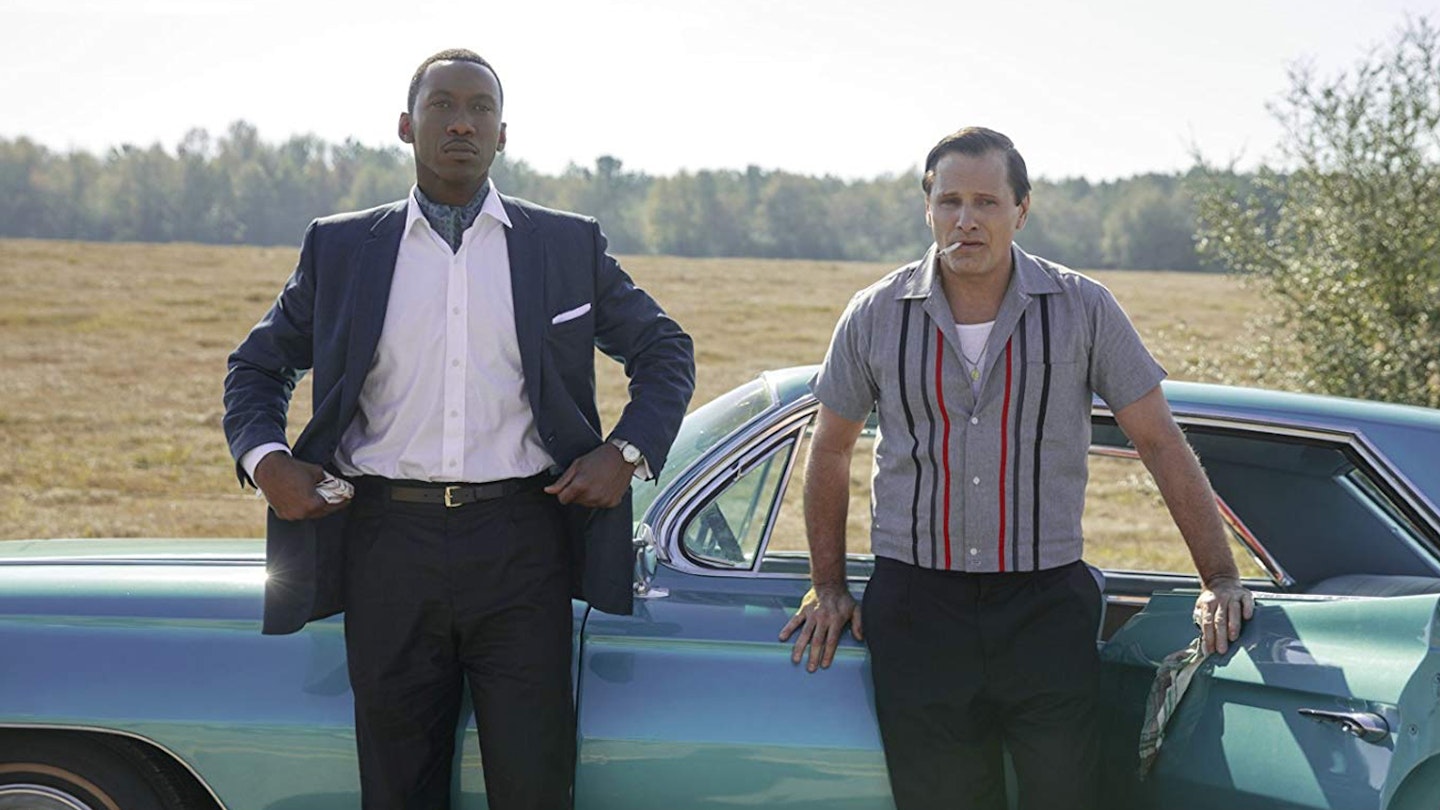
08 Feb 2019
The story of Tony Lip and Don Shirley is not a wildly original one. It’s an odd-couple road trip about how we’re all not so different, after all. No wheels are being reinvented here: it’s Driving Miss Daisy by way of Planes, Trains And Automobiles , if you like. But the execution is so outrageously appealing and good-hearted that surrendering to its charms feels like the only option. Peter Farrelly , most commonly known for leaning on the cheapest, dirtiest jokes he can find with his brother Bobby, here summons a gentler, more character-driven kind of humour, while telling a serious story about the compromises that African-Americans have been long forced to make by an oppressive white status quo.
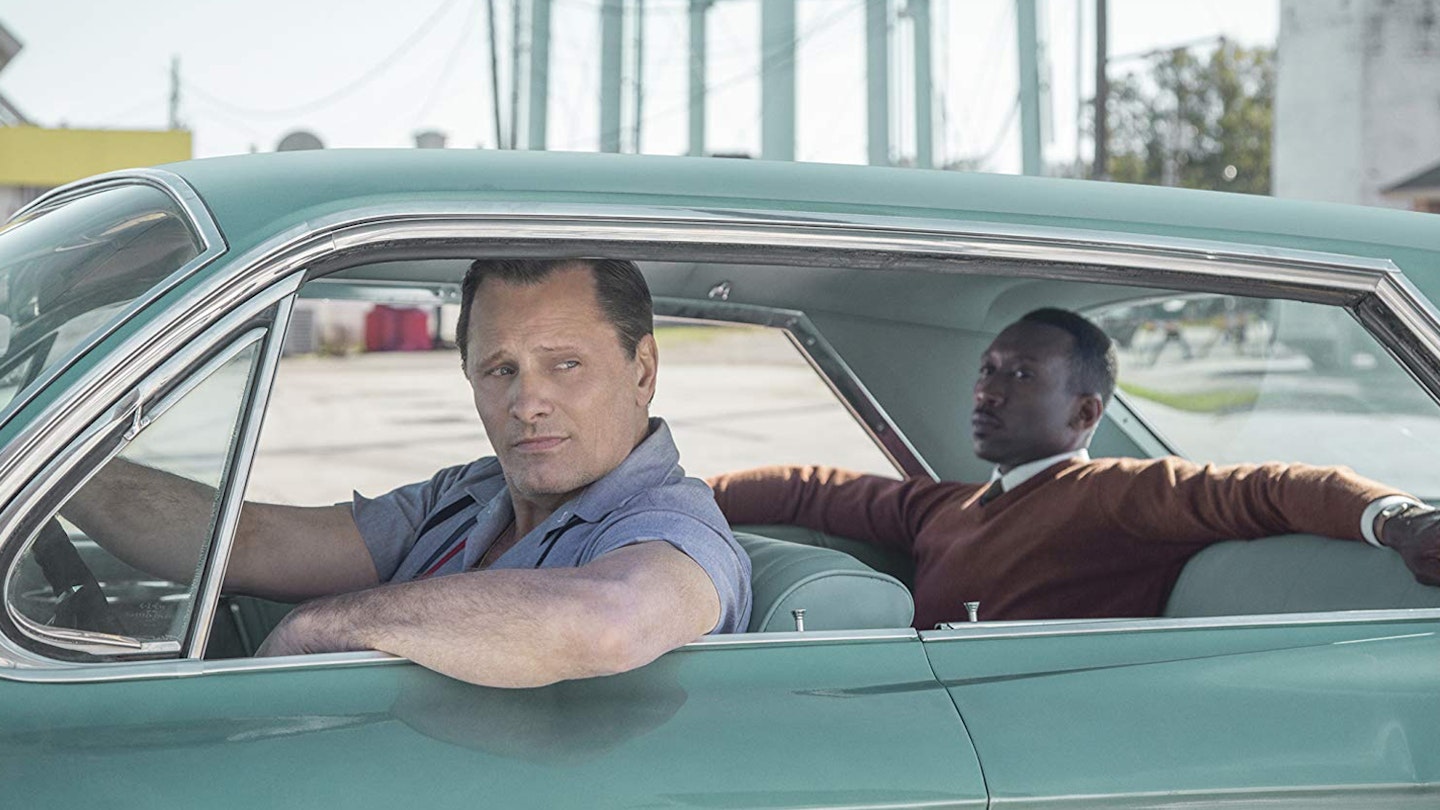
What makes the film so compelling is the chemistry that crackles from the central pair of actors. As Tony Lip, Viggo Mortensen ’s enjoyably larger-than-life performance sometimes skirts the fringes of caricature, but you can’t fault the all-encompassing commitment or his performance. As with Don Shirley, we’re soon worn down by his gregariousness, and taken by his transformation; any memory of the softly spoken Dane who once wielded the reforged sword from the shards of Narsil is soon quashed at the sight of his unbelievable (and apparently real) Italianate gut.
The central humanistic message is important, necessary and correct.
Mahershala Ali ’s Don Shirley is a contrast, in every sense. A model of quiet elegance and self-possession, there’s humour to be found in his obsessive-compulsiveness and almost regal particularisms. But Ali, who has always been an incredibly thoughtful actor, coats his performance with a dignity and melancholy. His is not the average black experience in America, but as we later learn, he deliberately chooses to tour more hostile areas of the country, using his position as a celebrated musician for the sake of progress.
There’s been a fair few criticisms of Green Book ’s somewhat rose-tinted take on the appallingly violent reality of the Jim Crow South. You could certainly argue that its handle on racial politics is simplistic. But the film doesn’t shy from depicting racism in its ugliness and sadism when it counts. That it also acknowledges the intersectionality of Don’s experiences as a gay black man should not be ignored.
There are legitimate concerns that Green Book settles for lazy tropes about white saviours, but the central humanistic message is important, necessary and correct, and the fact that what could be a stiff, awards-hungry ‘message movie’ is in fact a crowdpleasing slice of mainstream entertainment means that message can reach audiences in all corners. At a time when racists are feeling more emboldened than they have any right to, that’s a very welcome message indeed.
Related Articles
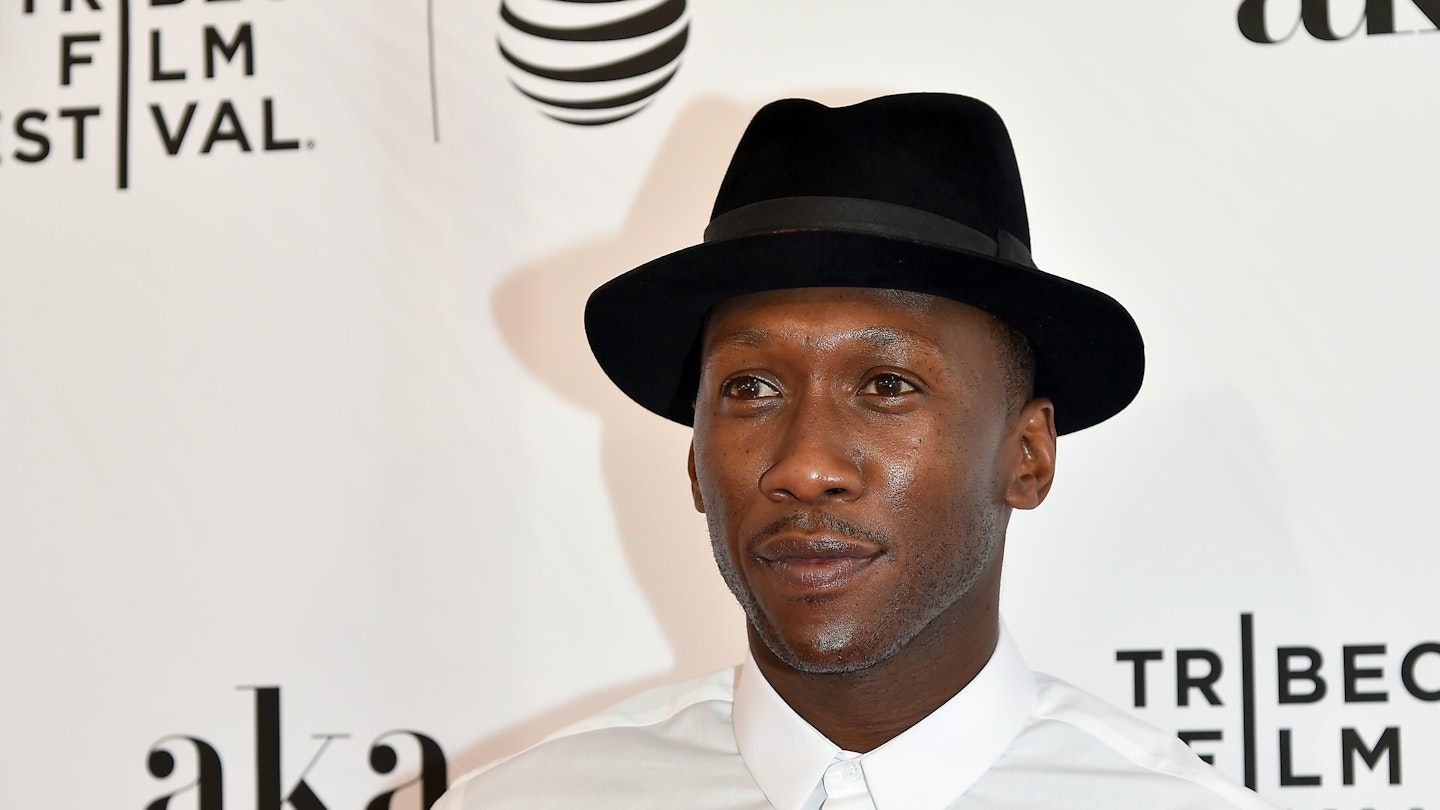
Movies | 04 06 2019
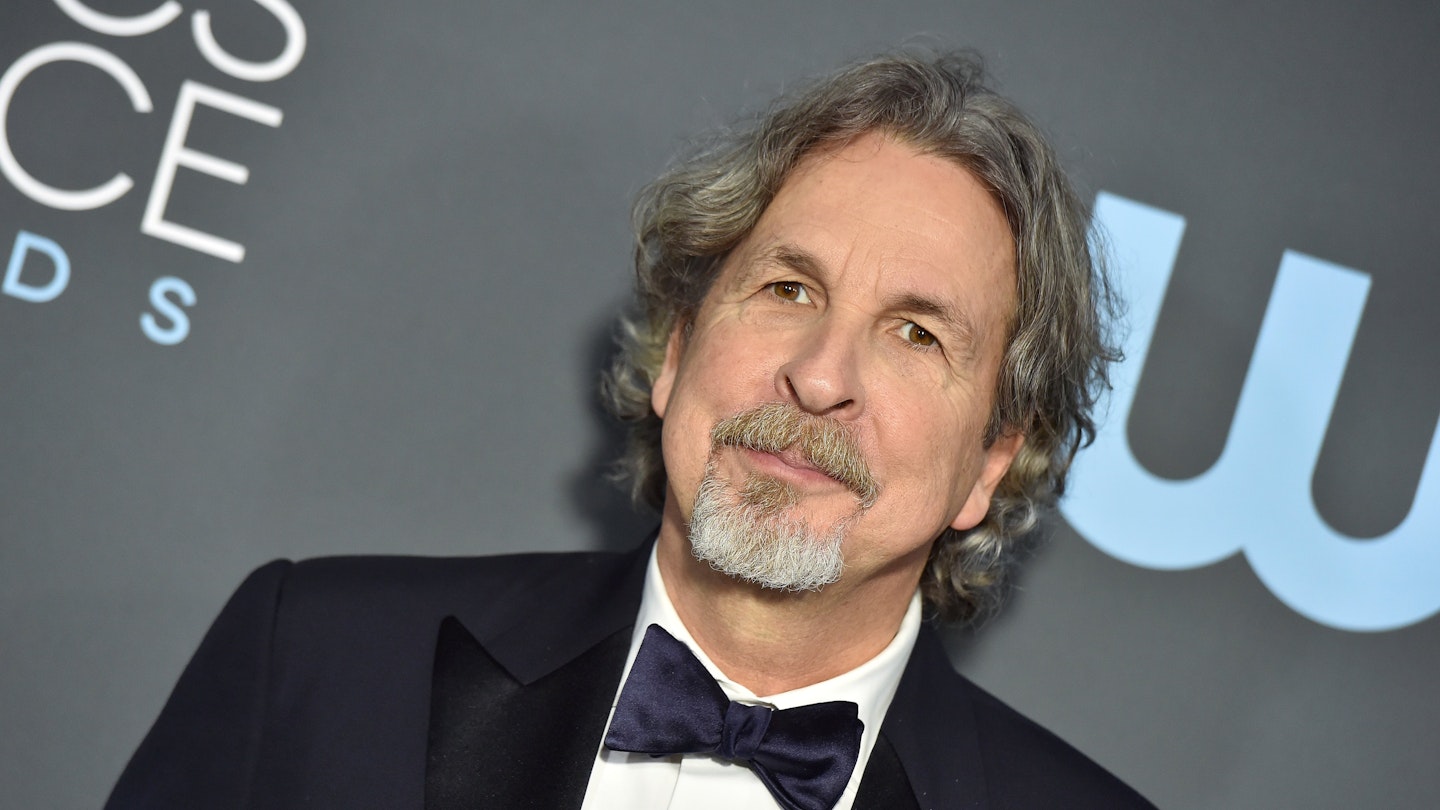
Movies | 28 04 2019

Movies | 31 03 2019

Movies | 17 03 2019
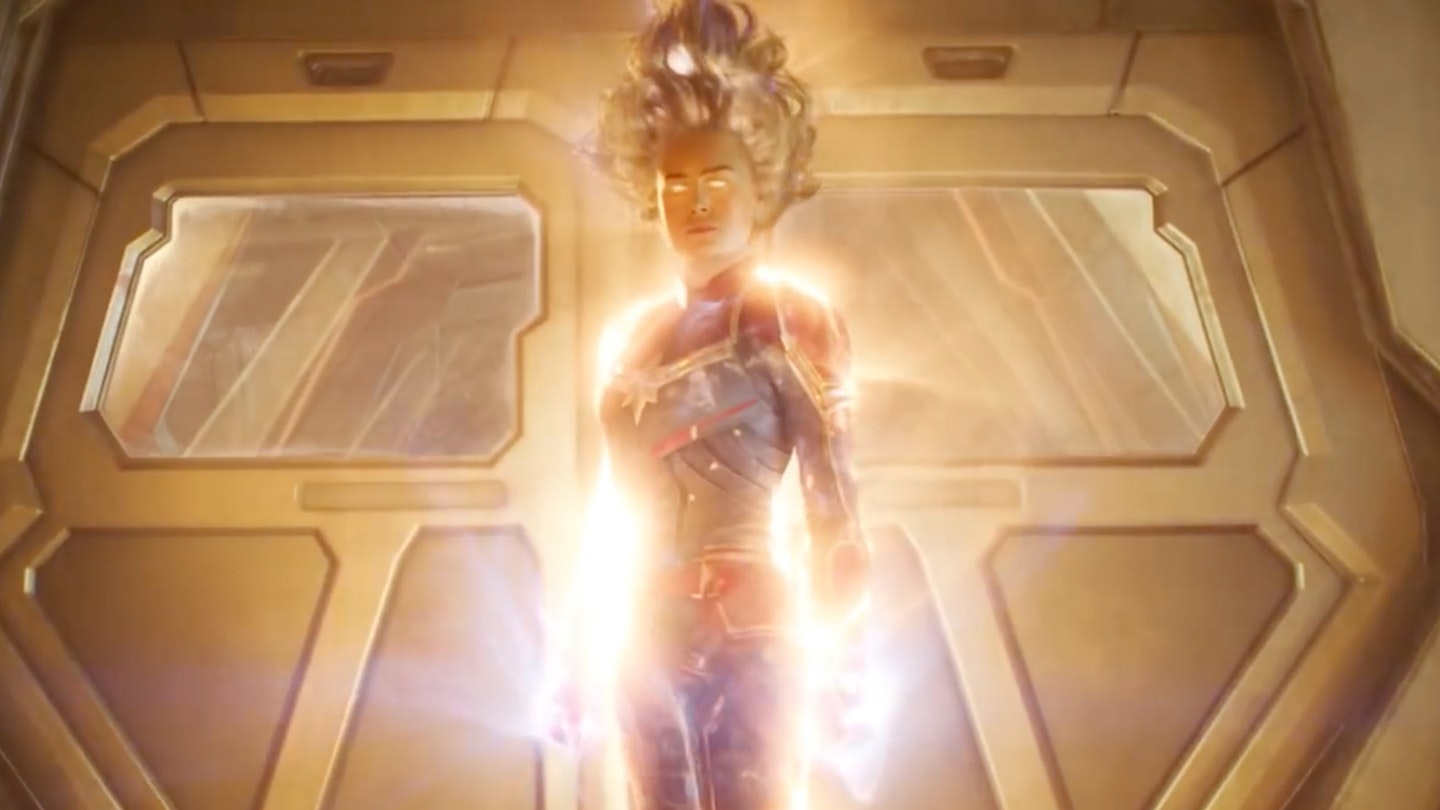
Movies | 10 03 2019

Movies | 03 03 2019
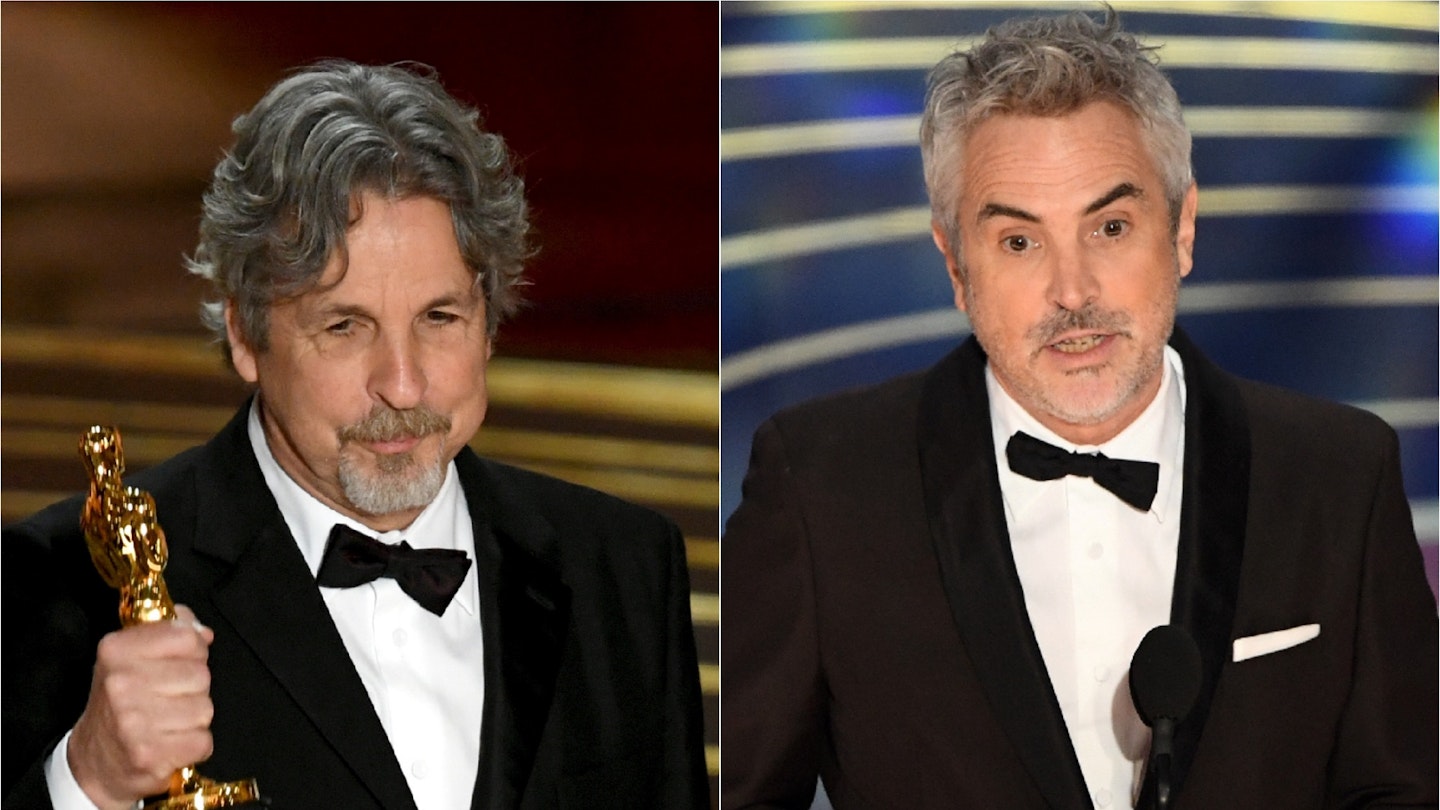
Movies | 24 02 2019

Movies | 17 02 2019
‘Green Book’ Review: Odd-Couple Dramedy Is Timely Feel-Good Movie
By Peter Travers
Peter Travers
Dr. Don Shirley ( Mahershala Ali ), an African-American classical-trained pianist on a jazz-trio tour in a part of 1960’s America that’s not prepared to embrace integration. In his search for a chauffeur, Don makes the curious choice of Frank Anthony Vallelonga, a.k.a. Tony Lip ( Viggo Mortensen ), a loudmouth Italian cliché temporarily off the Mob payroll as a bouncer back in New Yawk. They sure as hell don’t get off to an amicable start, with Don sitting like a king in a chic apartment above Carnegie Hall. Tony tells his client that he’s open-minded, claiming that “my wife and I had a couple coloreds over for drinks.” (In an earlier scene, two black men working in Tony’s home drink from glasses that he later trashes.)
What follows is a reverse twist on Driving Miss Daisy, as the duo set off on an eight-week concert tour filled with dangerous obstacles. Driver and passenger have two things on their side: Tony’s muscle and The Negro Motorist Green-Book, a travel guide published from 1936 to 1966 to assist black travelers about where to stay and what to avoid in the Jim Crow South. Welcome to Green Book, the winner of the Toronto Film Festival’s People’s Choice Award this year that’s “inspired” (that word!) by their real-life friendship.
Famed for the gross-out comedies he made with his brother Bobby — dump all you want on Dumb & Dumber, but Kingpin is immortal — Peter Farrelly’s impressive solo directorial debut the movie’s shifting tones; co-written by Farrelly, Brian Hayes Currie and Tony’s son, Nick Vallelonga, the script is filled with a piercing gravity that deepens the funny business. There are easy laughs when Tony teaches Don about the wonders of fried chicken while the musician helps his driver write letters home to his wife, Dolores (Linda Cardellini). And there are also bruising glimpses into a time when racial profiling had the law on its side. Green Book is a movie about class as well as race, and Farrelly rightly refuses to paint a pretty picture.
Editor’s picks
Every awful thing trump has promised to do in a second term, the 250 greatest guitarists of all time, the 500 greatest albums of all time, 25 most influential creators of 2024.
Ali, a Best Supporting Actor Oscar winner for Moonlight, is superb at finding the buried rage in a refined artist challenging fellow Americans who never accepted the abolition of slavery. He makes us see that Don is on his own when it comes to finding a place to belong. And the actor, who had help from a pianist double in the club scenes, is simply stupendous at showing Don alive in his art. Tony senses his genius, but is horrified that Don doesn’t know Chubby Checker or Little Richard. “I’m blacker than you are,” the working-class driver snaps.
Mortensen is terrific, having beefed up by 30 pounds to play this bruiser with a Bronx honk and the dazed realization that his fists can’t change a damn thing. Sure, Tony roughs up white hypocrites who applaud the musician onstage and then bar him from their restaurants. But don’t mistake him for another white savior. The role is a game-changer for an actor, whose dramatic chops are a given (see his Academy nods for Eastern Promises and Captain Fantastic ) but proves he’s got a real flair for comedy that feels revelatory. He and Ali could take their own double act on the road.
Green Book ends in a gush of Christmas-themed feel-good that will probably drive some folks nuts. But look closer and you’ll see that Farrelly never forgets the shadows lurking outside the fierce but fragile connection that Don and Tony have forged over two mercurial months on the road. Simplistic? Maybe. But in a time when our nation is more divided than ever, the movie offers the possibility of redemption. Thanks to the dream team of Mortensen and Ali, audiences will be cheering. And they’ll be right.
Drew Barrymore Says She Regrets Being an ‘Exhibitionist’ in Her Youth, 'Playboy' Cover
- Looking Back
- By Tomás Mier
Matthew Perry's Doctor 'Incredibly Remorseful' Over Role in Actor's Ketamine Death: Lawyer
- Accepts 'Responsibility'
- By Nancy Dillon
Charli XCX to Star in Erotic Thriller With Olivia Wilde and Cooper Hoffman
- Movie Magic
Kathryn Hahn on the Return of Agatha and Her MCU Future: "Who Are You Calling a Side Character?"
- By Brian Hiatt
Drama at the Ranch: 'Yellowstone' Drops New Teaser for Final Episodes
- Cowboy Chaos
- By Jon Blistein
Most Popular
Winona ryder gets frustrated by her younger co-stars who 'are not interested in movies': 'the first thing they say' is 'how long is it', all about rfk jr.'s daughter kick kennedy amid rumors she's dating ben affleck, tim burton explains why alec baldwin and geena davis aren't in 'beetlejuice' sequel, mariah carey's mother and sister die the same day, singer confirms: "my heart is broken", you might also like, ‘the end’ review: tilda swinton and michael shannon took shelter, but 20 years underground starts to get tedious, 21 must-have fashion and beauty products to invest in for fall, the best yoga mats for any practice, according to instructors, animated gem ‘memoir of a snail’ proves the medium is for every kind of story, ncaa nixes qr codes in move criticized as outdated.
Rolling Stone is a part of Penske Media Corporation. © 2024 Rolling Stone, LLC. All rights reserved.
‘Green Book’ Review: A Moving, Charming Buddy Movie About Race | TIFF 2018

Your changes have been saved
Email is sent
Email has already been sent
Please verify your email address.
You’ve reached your account maximum for followed topics.
The 10 Best Folk Horror Movies of the 2020s (So Far)
The 10 best arthouse revenge movies, ranked, the music in 'longlegs' means a lot more than you think.
If there was a pleasant surprise at this year's Toronto International Film Festival, it was Peter Farrelly 's interracial buddy movie Green Book , which came out of nowhere to win the festival's audience award and cement a place for itself in this year's Oscar race.
Viggo Mortensen stars as Tony Villelonga, aka Tony Lip, who works security at the Copacabana in New York City. When the club shuts down for a few months, he's forced to find a new job in order to make ends meet, and he's offered a gig as a driver. Of course, this is no ordinary job. His boss is Dr. Paul Shirley ( Mahershala Ali ), a renowned African-American pianist who has decided, with little regard for his own safety, to tour the Deep South, where racism still runs rampant. That's why he needs a driver who can handle himself on the road, and provide a little muscle in case the circumstances call for it. And so begins their road trip, with Tony's wife ( Linda Cardellini ) making sandwiches for the long ride.
Along the way, Dr. Shirley challenges Tony to be better, whether it’s his language or littering on the highway or stealing a jade rock that he "found" on the ground. Of course, Dr. Shirley's journey is not without its own set of challenges. For example, he performs for the white elite, but they won’t let him eat dinner alongside them, and still treat him like the help rather than the revered artist he is. Sometimes Tony is there to get him out of those racially-charged jams, but there are some sticky situations that he can't get Dr. Shirley out of, and in fact, only escalates with his lunkheaded machismo. The fact that Dr. Shirley maintains his dignity in the face of all this hatred is a testament to his character, and Ali does justice to the role by maintaining his composure, even when fire burns within his eyes. Perhaps that fire exists because he’s hiding a secret, one that Tony is careful not to judge him for. Mortensen does a wonderful job of showing Tony's big heart in this surprising sequence, which is quite effective.
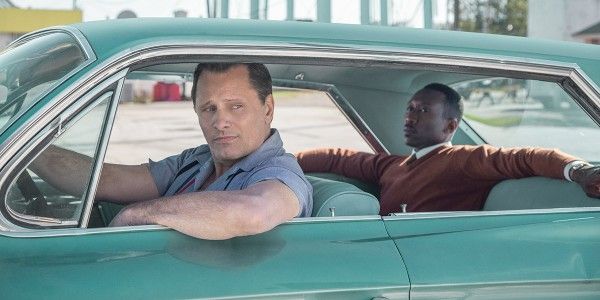
In the middle of all of this, Dr. Shirley helps Tony pen love letters to his wife. If there's a weak element to this film, it's probably this one, as Tony's marriage isn't particularly all that interesting. But it's important that one of the two leads has a family, if only to contrast the fact that the other doesn't. Indeed, Dr. Shirley has no family or significant romantic interest, as he is instead surrounded by artifacts from his worldly adventures. That's why his friendship with Tony -- inspired by a true one, as the trailer so helpfully notes -- is so meaningful. Even though Tony can't always find the right words to communicate his feelings, he and Dr. Shirley come to an understanding as men. It may sound Lifetime-y, but it's actually very touching, brought to life by the grace of two wildly talented performers in sync with each other. Seriously, this film is like a duet, with laughs and tears in equal measure.
The title refers to The Negro Motorist Green Book , which African-American visitors to the South used as a guide to identify which hotels and restaurants would welcome them without hassle. It doesn't have much bearing on the film -- there aren't a bunch of scenes where Tony consults the book or anything -- but it's actually an interesting way to sell this film, symbolically, at least.
Those who dismiss Green Book as little more than “a reverse Driving Miss Daisy ” would be wrong to do so. This is a truly moving, wonderfully charming crowdpleaser that strikes me as perfect film to see with your family over Thanksgiving, when it is scheduled for release. Believe the hype, this is the real deal, and a major accomplishment for director Peter Farrelly. Let this be a lesson not to put filmmakers, or artists of any kind, really, into a box. For in the end, Green Book says it takes more than genius, it takes courage to change people’s hearts. Well it also took some courage for Farrelly to challenge himself with this kind of material, which can be especially tricky in the hands of a white filmmaker, but the audience ate it up, and bolstered by two excellent performances, it may very well prove to be the sleeper hit of awards season.
For more of our reviews from the 2018 Toronto International Film Festival, click on the links below:
- American Dharma
- Assassination Nation
- Beautiful Boy
- Can You Ever Forgive Me?
- The Death and Life of John F. Donovan
- The Front Runner
- The Hate U Give
- Hotel Mumbai
- If Beale Street Could Talk
- The Kindergarten Teacher
- Old Man & the Gun
- Outlaw King
- The Predator
- The Sisters Brothers
- The Standoff at Sparrow Creek
- A Star Is Born
- What They Had
- White Boy Rick
- Viggo Mortensen
Notice: All forms on this website are temporarily down for maintenance. You will not be able to complete a form to request information or a resource. We apologize for any inconvenience and will reactivate the forms as soon as possible.
- DVD & Streaming
Content Caution
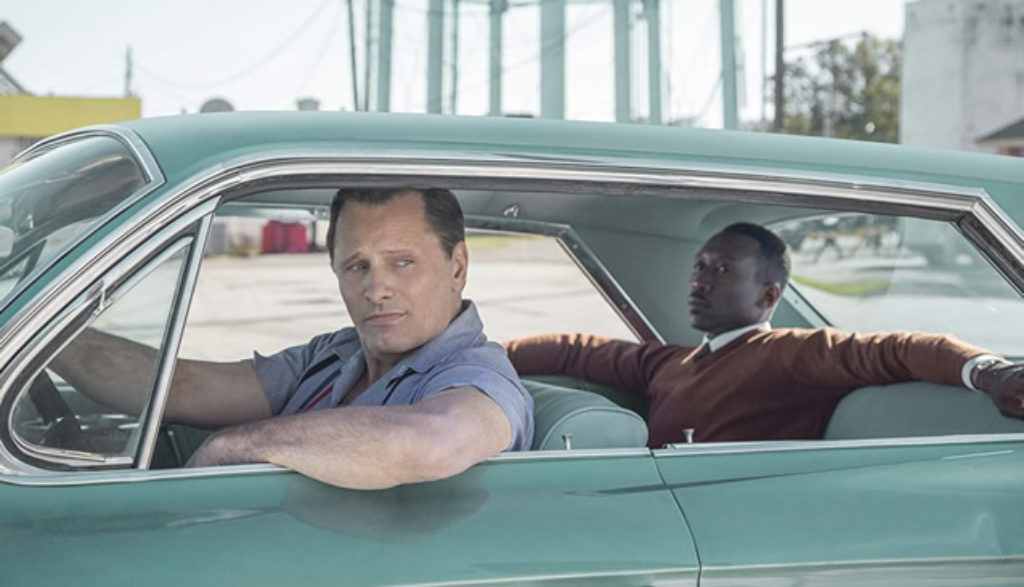
In Theaters
- November 21, 2018
- Viggo Mortensen as Tony Lip Vallelonga; Mahershala Ali as Dr. Don Shirley; Linda Cardellini as Dolores Vallelonga; Dimeter Marinov as Oleg; Mike Hatton as George; Iqbal Theba as Amit
Home Release Date
- March 12, 2019
- Peter Farrelly
Distributor
- Universal Pictures
Movie Review
The Green Book was birthed from tragic necessity.
For 30 years, The Negro Motorist Green Book guided black travelers through segregated America. In an era when many hotels and restaurants refused to serve or shelter African Americans (particularly, but not entirely, in the South), the Green Book was designed (as the book itself said) to give “the Negro traveler information that will keep him from running into difficulties, embarrassments and to make his trip more enjoyable.”
But the Green Book can’t do it alone. On the trip that Dr. Don Shirley’s planning, it’ll help to have a little muscle.
It’s 1962, and Shirley is one of the world’s most accomplished pianists. He gave his first public concert at age 3. He played with the Boston Pops at 18. He’s earned three doctorates (in music, psychology and the liturgical arts), knows eight languages and plays music like no one else.
He’s also black, about to embark on a concert tour through the Deep South.
He’s got fans down there; plenty of them. But while they’ll pay to hear him—stand and cheer for him—they won’t let him sleep in their beds or eat at their tables or use their restrooms. Tradition , they’ll say. It’s just not done , as they block the door to the bathroom and point to the outhouse out back.
Shirley knows all this, of course. He still insists on going, but he’s not naive.
So he’s bringing along a driver—a rough-hewn nightclub bouncer named Tony Vallelonga, more commonly known as Tony Lip. Shirley hires Tony at $125 a week, plus expenses. For that, Tony’s supposed to keep the car on the road, keep to the schedule and keep an eye on the Green Book . Easy enough, right?
But both know that Tony’ll be expected to keep Shirley safe, too. And Green Book or not, that won’t be easy.
Positive Elements
Shirley’s swing through the South wasn’t mandated by the record company. We learn that the pianist could make three times as much touring far more friendly confines. For him, the tour is all about challenging and changing some entrenched attitudes in these segregated states—giving people a glimpse at a wildly accomplished, impeccably erudite black man and pushing back on centuries of racism. Shirley wants to challenge those attitudes as politely, but as firmly, as he can. As his traveling cellist tells Tony, “Genius is not enough. It takes courage to change people’s hearts.”
First on the list: Tony Lip himself. And it’s not just Tony’s racial attitudes that Shirley challenges: It’s what it means to be a good, thoughtful citizen. When Tony pockets a souvenir from the parking lot of a roadside shop, Shirley insists that he pay for it or put it back. When Tony flings a paper cup out of the car window, Shirley makes him, stop, back up and retrieve the litter. Shirley encourages Tony to improve his diction, too. And while it’s unclear whether any of these suggested improvements ever take deep root in Tony’s character, he’s deeply impressed by the man who suggests them.
But change is a two-way street, and the driver winds up changing Shirley, too. Tony introduces the tightly wound piano player to the joys of off-the-bone fried chicken and encourages him to loosen up. He becomes not just a confidante and admirer, but a friend—something all too rare in Shirley’s well-heeled, solitary life. And when the tour experiences unexpected hiccups—everything from a subpar concert piano to a life-threatening clash at a bar—Tony proves to be both loyal and resourceful (though, admittedly, not all of his strategies can earn an unqualified hip, hip, hooray from Plugged In ).
A couple more notes: Shirley is reluctant to take Tony away from his wife and two sons for eight weeks, and Shirley calls his wife, Dolores, for her blessing. But, perhaps surprisingly, Tony’s bond with Dolores actually gets stronger while he’s away. Tony dutifully writes to her every chance he gets, and soon Shirley begins to help—serving as Tony’s own Cyrano de Bergerac. The letters turn poetically romantic, and back home Dolores reads them out loud to her friends and sisters-in-law—spawning a great deal of letter envy among them.
When Tony is offered a job by some local mobsters—a job Tony could use—he turns down the offer and instead pawns his watch to make ends meet.
Spiritual Elements
Tony is a profane man from a religious family—one with crosses on the walls and one that says grace before every meal. One of Shirley’s doctorates is in “liturgical studies,” which suggests at least a passing familiarity with church. (The real Don Shirley often played spirituals and Gospel songs, and he released a whole Gospel album after the events depicted in the movie.) We hear a reference to “God’s green earth,” and someone says, “God bless.”
When Tony tells Shirley that his wife bought an album of his—something about “Orphans” with little kids on the cover—Shirley corrects him. The album’s title is actually Orpheus & the Underworld , and the “children” on the cover are actually “demons in the bowels of hell.”
Sexual & romantic Content
During one tour stop, Tony’s called late at night to a local YMCA, where Shirley and another man are handcuffed to some pipes, naked or nearly so. (We don’t see anything critical, and Tony tosses a towel on Shirley before audiences see more than a split-second of his birthday suit.) We learn that Shirley and the other man were engaged in some intimate activity, according to the two police on scene. Tony bribes both officers to let Shirley go and to keep the matter quiet. Later, when Shirley apologizes for his actions that night, Tony shrugs it off. He’s been working New York City nightclubs for a long time now, he says. “I know it’s … a complicated world.”
Shirley mentions that he was married once, but that being married and being a concert pianist were ultimately incompatible.
Tony loves his wife, Dolores, and we see the two get a little frisky in bed, kissing and cuddling and laughing. But Tony can’t wait to go to Pittsburgh, because he’s heard women’s breasts grow larger there (he says, using some very crass terms). Later, he tells Shirley that Pittsburgh was consequently something of a disappointment.
Violent Content
Early in the tour, Shirley gets roughed up by a trio of locals at a bar. Tony tries to defuse the situation peacefully, but when one draws a knife and threatens to use it on Shirley, Tony reaches to his back as if grabbing for a gun. The bar’s owner then draws a shotgun and forces the locals to let Shirley go.
Tony has other violent altercations at times—including punching a policeman in the face when the racist officer insults Shirley and compares Tony’s own Italian background to being black. (Both he and Shirley are thrown in jail.) While working as a bouncer (or, as he says, in “public relations”) for a fancy New York dinner club, he tosses out someone affiliated with a prominent mobster gang and then pounds the guy’s face in. (The owner of the club, a rival mobster, soon after offers Tony a job in his syndicate doing, the boss darkly suggests, “things.” Tony turns him down.)
A concert workman fails to get Shirley a Steinway to play for one of his concerts. (And even the one he procures is filled with trash.) When Tony protests on Shirley’s behalf, the workman refuses to help—using one or two racial slurs while he’s at it—and Tony cuffs him in the ear. Later that evening, we see that Shirley got his Steinway.
Someone points and fires a gun.
Crude or Profane Language
Two f-words and about two dozen s-words. We also hear “a–,” “b–ch,” “b–tard,” “d–n,” “h—,” “t-t,” “p-ss,” “pr–k” and “crap,” along with “n—er” and other racial slurs. God’s name is paired with “d–n” nearly 15 times, and Jesus’ name is abused about five times.
Drug and Alcohol Content
Shirley says that he has little regard for jazz or lounge pianists who play with a glass of whiskey on the piano. He insists it’s impossible to get respect that way.
But that doesn’t mean that Shirley doesn’t drink—and heavily—when he’s not at the piano. His concert rider requires a bottle of Cutty Sark whiskey at each stop, where he spends his evenings drinking alone. “Sometimes he gets sad,” Tony writes one day. “That’s why he drinks too much.”
Tony smokes, which sometimes drives Shirley a little crazy. We see others light up cigarettes as well. Shirley and Tony sometimes find themselves at bars or nightclubs, and we see plenty of alcohol being consumed by patrons at such establishments.
Other noteworthy Elements
Green Book , obviously, depicts lots of negative racial attitudes—from hostile racist rednecks to the more genteel racism of some of Shirley’s well-heeled fans. They love the idea of someone like Shirley but still don’t want him sharing their restaurants or bathrooms.
Even Tony himself doesn’t think much of blacks himself before he takes Shirley’s job—tossing away a couple of glasses that two black workmen had used instead of simply washing them. (The movie doesn’t condone any of these racist leanings, of course, but audiences still see them.)
Tony gambles with some other chauffeurs at Shirley’s first concert stop. (Shirley’s embarrassed by Tony’s gambling, but Tony’s just happy that he won.) Tony swipes a rock from a giftshop parking lot (one that clearly isn’t meant to be taken) and grouses when Shirley tries to make him put it back. He litters, too.
Black and white .
At its most basic, black and white is all about contrast. No fashion is as bold as a black-and-white dress, no interior design as brash as white carpet against black walls. When we say something is black or white , we’re telling the world that nothing could be more obvious: We have black-and-white choices, black-and-white moral convictions. Some of us are said to see the world in terms of black and white.
I wonder sometimes whether that very language invites a certain oversimplification when it comes to race.
For some—the stereotypical racists we’ve seen throughout history (and in many a movie)—the races are as separate as black type on white paper. In many places in the 1960s, predominantly in the South, the idea of racial integration seemed an impossibility. The corrosive doctrine of “separate but equal” reigned.
Most of us know better today, of course. But even now, we risk stereotyping those who are different—whether those differences are racial, economic, religious or political. We sometimes still sort those differences based on nothing more than a handful of presuppositions.
Green Book takes such racial stereotypes, balls ’em up and throws ’em out the window. Don Shirley is a genius who feels just as alienated from his own race as he does from Tony’s. And even though Tony’s skin tone is just right for the 1960s South, his ethnicity is all wrong, and he suffers some of the same slights and slings that Shirley does. Together, they lead modern audiences through a dialogue about race relations then and now, even as the characters themselves have their own racial suppositions challenged.
Green Book is engaging, funny, moving and even inspiring. It reminds us that race relations are never just black and white: The complexities and subtleties could cover a color wheel.
But for families, some of the choices the movie makes are decidedly off-color. The language, period-appropriate or not, can be pretty rough. And the movie’s decision—without any historical grounding that I can find—to send Shirley into a one-night homosexual stand gives this film another content concern to consider.
But perhaps it’s strangely fitting that we can’t give Green Book a definitive yay or nay, a definite black-or-white verdict. It, like the world it portrays, is complex and sometimes difficult. But it still has something worthwhile to say.
For more ideas on how to have the “courage to change people’s hearts” regarding bigotry and prejudice, check out the following resources:
Hope for a Racially Divided Nation
Breaking Down Racial Barriers With God’s Love (Part 1 of 2)
How to Respond When Your Kids Are Bullied
At Home With TobyMac

Paul Asay has been part of the Plugged In staff since 2007, watching and reviewing roughly 15 quintillion movies and television shows. He’s written for a number of other publications, too, including Time, The Washington Post and Christianity Today. The author of several books, Paul loves to find spirituality in unexpected places, including popular entertainment, and he loves all things superhero. His vices include James Bond films, Mountain Dew and terrible B-grade movies. He’s married, has two children and a neurotic dog, runs marathons on occasion and hopes to someday own his own tuxedo. Feel free to follow him on Twitter @AsayPaul.
Latest Reviews

City of Dreams

Weekly Reviews Straight to your Inbox!

Want to stay Plugged In?
Our weekly newsletter will keep you in the loop on the biggest things happening in entertainment and technology. Sign up today, and we’ll send you a chapter from the new Plugged In book, Becoming a Screen-Savvy Family , that focuses on how to implement a “screentime reset” in your family!
Common Sense Media
Movie & TV reviews for parents
- For Parents
- For Educators
- Our Work and Impact
Or browse by category:
- Movie Reviews
- Best Movie Lists
- Best Movies on Netflix, Disney+, and More

Common Sense Selections for Movies

50 Modern Movies All Kids Should Watch Before They're 12

- Best TV Lists
- Best TV Shows on Netflix, Disney+, and More
- Common Sense Selections for TV
- Video Reviews of TV Shows

Best Kids' Shows on Disney+

Best Kids' TV Shows on Netflix
- Book Reviews
- Best Book Lists
- Common Sense Selections for Books

8 Tips for Getting Kids Hooked on Books

50 Books All Kids Should Read Before They're 12
- Game Reviews
- Best Game Lists
Common Sense Selections for Games
- Video Reviews of Games

Nintendo Switch Games for Family Fun

- Podcast Reviews
- Best Podcast Lists
Common Sense Selections for Podcasts

Parents' Guide to Podcasts

- App Reviews
- Best App Lists

Social Networking for Teens

Gun-Free Action Game Apps

Reviews for AI Apps and Tools
- YouTube Channel Reviews
- YouTube Kids Channels by Topic

Parents' Ultimate Guide to YouTube Kids

YouTube Kids Channels for Gamers
- Preschoolers (2-4)
- Little Kids (5-7)
- Big Kids (8-9)
- Pre-Teens (10-12)
- Teens (13+)
- Screen Time
- Social Media
- Online Safety
- Identity and Community

How to Help Kids Build Character Strengths with Quality Media
- Family Tech Planners
- Digital Skills
- All Articles
- Latino Culture
- Black Voices
- Asian Stories
- Native Narratives
- LGBTQ+ Pride
- Best of Diverse Representation List

Multicultural Books

YouTube Channels with Diverse Representations

Podcasts with Diverse Characters and Stories

- Common Sense Says
- Parents Say 20 Reviews
- Kids Say 40 Reviews
Common Sense Media Review

Crowd-pleasing drama explores race, class, friendship.
Parents Need to Know
Parents need to know that Green Book is a drama set in the 1960s about a racist Italian American man (Viggo Mortensen) who takes a temporary job chauffeuring an acclaimed black pianist (Mahershala Ali) during his concert tour of the Midwest and Deep South. Called by some a "race-flipped Driving Miss Daisy…
Why Age 13+?
Frequent language includes two uses of "f--k," plus "goddamn," "s--t," "a--hole,
Fistfight after verbal confrontation in and in front of nightclub. A black man g
Tony smokes cigarettes constantly. A woman sells cigarettes at a club. Adults dr
A married couple hugs and kisses. Two people who were engaging in sexual activit
Brands used to establish historical accuracy include Cadillac, Cutty Sark whisky
Any Positive Content?
Positive messages related to race, class, discrimination. Encourages people to l
Dr. Shirley is a genius, a world-class musician who takes the time to help Tony
Frequent language includes two uses of "f--k," plus "goddamn," "s--t," "a--hole," "bulls--t," "son of a bitch," "Jesus Christ," "bastard," "pr--k," "t-ts," "hell," "crap," and "garbage." "Christ" as an exclamation. Also many racial epithets: "eggplant," "coon," "boy," the "N" word, "chink," "spool," "kraut," "stooge," and "brillo pad," as well as "wop," "guinea" and "hillbilly." The word "colored" is used to describe black people.
Did you know you can flag iffy content? Adjust limits for Language in your kid's entertainment guide.
Violence & Scariness
Fistfight after verbal confrontation in and in front of nightclub. A black man gets beaten up in a bar for no reason. Tony threatens to pull out a gun to defend Dr. Shirley; bartender then pulls out shotgun. Police officer stops Tony and Dr. Shirley's car; after Tony punches cop, cop arrests both men, making veiled threats about "boy" being "his." Men who engaged in sexual activity are caught, handcuffed.
Did you know you can flag iffy content? Adjust limits for Violence & Scariness in your kid's entertainment guide.
Drinking, Drugs & Smoking
Tony smokes cigarettes constantly. A woman sells cigarettes at a club. Adults drink alcohol in bars at meals, parties, and by themselves. Dr. Shirley drinks from a bottle of whiskey (presumably nearly the entire bottle) every night. He gets drunk at a bar.
Did you know you can flag iffy content? Adjust limits for Drinking, Drugs & Smoking in your kid's entertainment guide.
Sex, Romance & Nudity
A married couple hugs and kisses. Two people who were engaging in sexual activity are shown after the fact, naked but curled up so that no sensitive body parts are shown.
Did you know you can flag iffy content? Adjust limits for Sex, Romance & Nudity in your kid's entertainment guide.
Products & Purchases
Brands used to establish historical accuracy include Cadillac, Cutty Sark whisky, Steinway pianos, Kentucky Fried Chicken.
Positive Messages
Positive messages related to race, class, discrimination. Encourages people to look beyond prejudices to see people as individuals, not stereotypes. Even if some stereotypes apply (Tony is Italian and does like pasta and pizza), they shouldn't be assumed (Dr. Shirley has never eaten fried chicken). Argues that individual connection and friendship can break down barriers, discrimination, racism. Empathy a clear theme.
Positive Role Models
Dr. Shirley is a genius, a world-class musician who takes the time to help Tony better himself. He's also an example of a man doing his best to defy stereotypes about black men in Jim Crow South. Tony doesn't allow his racism to get in the way of taking the job, connecting with Dr. Shirley. They learn to look past prejudices and form an unlikely bond.
Parents need to know that Green Book is a drama set in the 1960s about a racist Italian American man ( Viggo Mortensen ) who takes a temporary job chauffeuring an acclaimed black pianist ( Mahershala Ali ) during his concert tour of the Midwest and Deep South. Called by some a "race-flipped Driving Miss Daisy ," the crowd-pleasing story explores how the two men had to abide by the titular Green Book, a "traveling while black" guide to restaurants and accommodations that allowed black guests in the '60s. Characters get beaten and threatened (including with a shotgun), there's a fistfight, and two men are handcuffed after being caught engaging in sexual activity (nothing sensitive shown). There's also quite a bit of language (including "s--t," the "N" word, and more) and drinking/smoking. But the film's messages about empathy and the danger of prejudice and stereotypes are important and thought-provoking. And the story is a timely reminder of how, just a few decades ago, there were whole parts of the country where segregation kept African Americans from fully participating in civic life. To stay in the loop on more movies like this, you can sign up for weekly Family Movie Night emails .
Where to Watch
Videos and photos.

Parent and Kid Reviews
- Parents say (20)
- Kids say (40)
Based on 20 parent reviews
The review for "Sex, Romance & Nudity" is technically correct but intentionally misleading.
What's the story.
Inspired by a true story, GREEN BOOK takes place in 1962 and follows Tony "Lip" Vallelonga ( Viggo Mortensen ), a white, Italian American New York City bouncer who takes a temporary job driving black concert pianist Dr. Don Shirley ( Mahershala Ali ) as he travels throughout the Midwest and the Deep South on a concert tour. The movie's title refers to a (now historical) guide for what Tony calls "traveling while black": The Green Book is a directory of restaurants and accommodations that cater to African Americans throughout the segregated South. As the vulgar, working-class, and admittedly racist Tony and the incredibly well-educated, intelligent Dr. Shirley get to know each other on the road, they challenge stereotypes and grow to form an unlikely friendship. But the farther into the South they travel, the more they're forced to deal with everything from Jim Crow laws to hate crimes.
Is It Any Good?
Mortensen and Ali both give fabulous performances in this feel-good road-trip drama that's part buddy comedy, part history lesson, and part social commentary on friendship and race. Director Peter Farrelly , best known for raunchy comedies like There's Something About Mary , brings out the humor in Tony and Dr. Shirley's interactions; he allows the actors to shine in completely opposing ways. Mortensen, who reportedly gained more than 30 pounds for the role, immerses himself in showy Bronx bravado, while Ali is a picture of nuanced restraint, with plenty of emotion simmering beneath the surface. Both portrayals are award-worthy, as are Ali's musical performances (he went through extensive piano training to pull them off).
It's not easy to revisit a time in history when gifted black artists could entertain all-white crowds but not sit or dine among them -- or even use the same bathroom. Dr. Shirley refuses to lower himself via vulgarity or even by listening to popular music (he can't tell Aretha Franklin from Chubby Checker), and he fully understands that the moment he steps off stage, he's just another black man to the white audiences who moments earlier applauded his talent. While Tony isn't in the role of the dreaded "white savior," Green Book 's story is more about him than Dr. Shirley, who's infinitely more self-aware -- and also more of a mystery. It feels like a bit of a missed opportunity that Dr. Shirley's personal life isn't explored via more than a couple of references to his estranged brother and a failed marriage and one poignant monologue about not fitting into either white or black society. Especially considering that viewers meet nearly all of Tony's large Italian family, including his more open-minded wife, Dolores ( Linda Cardellini ), to whom he writes (with help from Dr. Shirley) increasingly poetic love letters from the road. Really, the entire movie is a love letter of sorts -- to a friendship that's a reminder that the world needs more empathy and human connection ... not to mention mind-blowing music.
Talk to Your Kids About ...
Families can talk about the violence in Green Book . What effect does it have? What does it mean for the story? What's the impact of media violence on kids?
How does the movie address and handle the topics of race and segregation? What about class? How does Dr. Shirley defy others' prejudices and expectations?
Which characters do you consider role models ? What character strengths do they display? How do both main characters show empathy ?
Some have criticized the movie for the fact that, despite the title, it focuses more on Tony's life than Dr. Shirley's. And some of Dr. Shirley's relatives have taken issue with how he's portrayed in the film. Why do you think filmmakers might choose to alter facts when making a movie? How can you find out more about what happened?
How have things changed since the movie's 1960s setting? How haven't they?
Movie Details
- In theaters : November 16, 2018
- On DVD or streaming : March 12, 2019
- Cast : Viggo Mortensen , Mahershala Ali , Linda Cardellini
- Director : Peter Farrelly
- Inclusion Information : Black actors, Female actors
- Studio : Universal Pictures
- Genre : Drama
- Topics : History
- Character Strengths : Empathy
- Run time : 130 minutes
- MPAA rating : PG-13
- MPAA explanation : thematic content, language including racial epithets, smoking, some violence and suggestive material
- Awards : Academy Award , Common Sense Selection , Golden Globe - Golden Globe Award Winner
- Last updated : June 20, 2024
Did we miss something on diversity?
Research shows a connection between kids' healthy self-esteem and positive portrayals in media. That's why we've added a new "Diverse Representations" section to our reviews that will be rolling out on an ongoing basis. You can help us help kids by suggesting a diversity update.
Suggest an Update
What to watch next.

And the Children Shall Lead

The Long Walk Home

Driving Miss Daisy
Drama movies that tug at the heartstrings, great movies with black characters, related topics.
Want suggestions based on your streaming services? Get personalized recommendations
Common Sense Media's unbiased ratings are created by expert reviewers and aren't influenced by the product's creators or by any of our funders, affiliates, or partners.
- Skip to main content
- Keyboard shortcuts for audio player
Movie Interviews
'green book' is about race — and also friendship, class and masculinity.
Sydney Harper

Mahershala Ali as musician Donald Shirley in Green Book , directed by Peter Farrelly. Universal Pictures, Participant, and DreamWorks hide caption
Mahershala Ali as musician Donald Shirley in Green Book , directed by Peter Farrelly.
Don "Doc" Shirley could have been one of the most famous classical musicians in the world had it not been for the color of his skin.
As a black man playing piano in the 1960s, Shirley was excluded from many of the great American music venues of the day. The indignities continued when he decided to tour the Deep South in 1962. Not only did he have to play what he felt were less desirable stages and styles, but the trip also required a white driver to get him safely from club to club.
The movie Green Book tells the story of Shirley and of his friendship with Tony Vallelonga, the white man he hired as his driver during that 1962 tour. In an interview with NPR, Mahershala Ali, who plays Shirley, describes why the musician felt compelled to go south.

Code Switch
The green book: celebrating 'the bible of black travel'.

Movie Reviews
'green book' offers by-the-book uplift.
"It would have been too easy for him to stay up north or go to Europe and tour and travel and make money," Ali tells Morning Edition co-host Rachel Martin. "I think he was seeking to penetrate the stereotypes, especially once you cross that Mason-Dixon line. Doc Shirley wanted to expose himself to that environment for the good of changing minds and hearts."
On the tour, Shirley and Vallelonga used The Negro Motorist Green Book, a directory of businesses across the country that welcomed black travelers at a time when many places didn't.
A classical pianist and composer, Shirley grew up with dreams of playing on the world's most prestigious concert stages. He began collecting musical achievements early, learning piano at the age of 2 and performing his professional debut with Tchaikovsky's Piano Concerto No. 1 in B-flat minor at the Boston Pops at 18.
But Shirley's dreams of playing classical piano were deferred when a mentor advised that as a black man, he wouldn't be welcomed on concert stages around the world. He diverted from his classical aspirations to playing jazz, performing genre-bending compositions that also blended Negro spirituals and hints of classical music.
Interview Highlights
On why Shirley hired Vallelonga, who was openly racist, to drive him
I don't know if he would have even thought he could find someone else that would be that different. If you think about a white man agreeing to work for a black man in 1962 and drive him around in the South, it would have been challenging to find someone who could check all the boxes. I think that he approached it — and I'm guessing a bit — but I believe he would have approached it from the standpoint of believing that he would be able to be in control of the space in the car because he is the boss. He tolerates it because for him to complete this tour he needs his presence, but Tony needs Doc as well.
On the film's themes of masculinity and identity
It is a lot about masculinity and identity – and also giving people space to define that for themselves. As we're born, we're constantly having this negotiation between who we feel we are or what we feel we are with what the world is saying and guiding us to be, so that we all fit nicely into our categories. It's so much more complicated than that. I haven't seen Don Shirley's archetype before, and that was something that was really attractive to me because he was multidimensional.
If you look at Nina Simone — as much as we love and appreciate Nina Simone and her contributions to music and art — Nina Simone was never the Nina Simone that she wanted to be. She wanted to be a classical pianist. Don Shirley wanted to be a classical pianist. That's the experience of the black artist in this country — constantly being pointed and steered towards what's commercially profitable or where socially you're acceptable but not necessarily toward your talent and your freedom, and therefore eventually the fulfilling of your own potential.
On Ali's own perspective of fulfilling his potential as a black artist
Looking from my father to my grandfather, grandmother, my family — you inherit a little bit of the struggle. It means that even post-Oscar I have to advocate for myself. ... It doesn't mean that "Here is this trophy and then here's a leading role.' The conditions still are what they are, but you might have to say, "Hey, that second lead that you've handed me this script for? That's a cool part but I've done so much of that in my life. This leading part? I really want to play that part. That's the part I want to play."
I'm proud, and I feel fortunate to be in that place where I am in a position to speak up on certain things and perhaps change things, not only for myself but for a whole community of people at times. And any and all of us in those type of positions, when we have that kind of platform, have to be very conscious of having that responsibility and do our best to do good and be responsible with it.
Note: The broadcast version of this story aired Nov. 23. The digital story published Nov. 27.
- nina simone
- Search Please fill out this field.
- Newsletters
- Sweepstakes
- Movie Reviews
Viggo Mortensen and Mahershala Ali make odd-couple story shine in Green Book': EW review
:max_bytes(150000):strip_icc():format(webp)/image001-1-96bff255cc7d4c8da59d9d4192867e86.jpg)
Viggo Mortensen has played nearly everything onscreen — Amish barn raiser, Russian mob fixer, backwoods radical, Tolkien warrior king — but he’s never been a mook. It’s almost impossible to picture the fine-boned Danish-American actor as Tony “Lip” Vallelonga until you see him up there, all marinara-sauced vowels and Brylcreemed hair, working his bada bing like Joe Pesci’s chin-dimpled brother.
As a Bronx security man who agrees to drive a black musician (Mahershala Ali) through the Deep South circa 1962, he has by far the showiest role in Peter Farrelly’s winning dramedy, and it might finally earn him the Oscar he’s long deserved. The movie wouldn’t work, though, without the elegant, understated balance of his counterpart.
Ali’s Dr. Don Shirley is a brilliant piano maestro, celebrated in the world’s finest private homes and concert halls — he’s performed twice for the sitting president and lives in a lavish apartment above Carnegie Hall — but he hasn’t ever taken his show below the Mason-Dixon. He also doesn’t quite know what to do with a man like Tony, with his bearish habits and blunt-force personality.
Green Book is inspired by a true story, and the script — written by Farrelly, Brian Currie, and Vallelonga’s real-life son Nick — hits many of the beats you’d expect. The bigotry the pair encounters ranges from politely insidious to outright savage; the odd-couple bonding happens inevitably, in picturesque fits and starts.
But it’s hard to overstate how charming it all is, and how much both actors make the material shine. (Linda Cardellini is great, too, in a small but pivotal role as Tony’s wife.) In a world that seems to get uglier every day, this movie’s gentle heart and mere humanity feel like a salve. B+
Related content:
- See the stars of AFI Fest in EW and Audi’s portrait studio
- Green Book team on why the film’s ‘feel-good’ label ‘makes it sound squeakier-clean than it is
Related Articles
- Become a Critical Movie Critic
- Movie Review Archives

Movie Review: Green Book (2018)
- Howard Schumann
- Movie Reviews
- No responses
- --> November 26, 2018
Martin Luther King’s message that people should be judged not on the color of their skin but on the content of their character came one year too late to reach the folks encountered by black Jamaican jazz pianist Dr. Don Shirley (Mahershala Ali, “ Hidden Figures ”), in his 1962 concert tour of the segregated Deep South. In Peter Farrelly’s warm and human comedy/drama Green Book , Shirley undertakes the journey together with Tony Vallelonga (Viggo Mortensen, “ Captain Fantastic ”), a night club bouncer who is known to his Italian mob pals in the Bronx as Tony “Lip.” While Tony was hired to do the driving, his main job, unacknowledged though it may be, was to provide physical protection for Shirley from any unwanted encounters with the locals south of the Mason-Dixon Line.
Inspired by a true story (isn’t everything?) and co-written by Nick Vallelonga and Brian Hayes Currie, the film’s title refers to the “Negro Motorist Green Book,” a guide used for many years by black travelers looking for hotels and restaurants in the Deep South where they can feel safe from discrimination and physical harm. Needless to say, neither the hotels nor the restaurants have many stars in the latest Michelin guide. We are first introduced to Tony who is working at the legendary Copacabana, a mob-connected New York nightclub known for its ability to attract name entertainers such as Frank Sinatra, and Sammy Davis Jr. When the Copa closes for renovations, Tony is open to an offer to become a driver for Doctor Shirley whose ostentatious living quarters above Carnegie Hall, to quote former U.N. Ambassador Adlai Stevenson, “staggers the imagination and converts vanity to prayer.”
Racism is not foreign to Tony’s outlook on life as shown when he throws the glasses used to serve water to black workmen in the garbage, but he is open to new experiences. Even though the tour will take him away from his wife Dolores (Linda Cardellini, “ The Founder ”) and his two small children for eight weeks, Tony promises to write often but will need some assistance from his cultured employer. As two Cadillac’s make their way along the highway, one containing The Don Shirley Trio’s cellist Oleg (Dimiter D. Marinov, “ Act of Valor ”) and bassist George (Mike Hatton, “Vigilante Diaries”), and the other the reserved and tightly-wound Shirley in the back seat and the chatty, uninhibited driver in the front.
Though the two travelers have little in common, their witty interplay on the road expands Don’s horizons as Tony provides samples of Little Richard, Chubby Checker and Aretha Franklin and, after much resistance, introduces him to the gourmet pleasures of Kentucky Fried Chicken (heaving their bones out of the window). Meanwhile, Don offers Tony some assistance with his grammar and teaches him about Orpheus and his demons, neither of which he needs to know to do his job. When they leave Pennsylvania and Ohio and head for Raleigh, Macon, Memphis, Little Rock, Baton Rouge, and Birmingham, however, things are no longer a laughing matter.
The pair get their first dose of reality when they hit their first “Green Book” stop, the run-down Carver Courts Motel to which Tony offers the relevant comment that “it looks like my ass.” While Don maintains his haughty above-the-battle demeanor, it soon becomes obvious that much of his persona hides a gnawing loneliness that becomes more evident as the two make progress on their journey. Encounters with the police and a confrontation with unfriendlies in a bar are just the tip of the iceberg and Don is forced to rely on Tony’s considerable skills as a Bronx tough to get him through some physically threatening moments. The irony for Shirley is that he is a much sought-after artist who performs for wealthy white audiences but is prohibited from eating in the same restaurants, using the same bathrooms, or sleeping in the same hotel with those who pay good money to hear him play.
Though Green Book suggests that these abominations are things of the past, we know better. During the performances, however, there is no black and white, no rich and poor, no coons or queers, only the exquisite power of the music which transcends hate and, at least for those few moments, reminds us of our common humanity and the fields of gold we all play in together. They are moments that can help us, as American poet Langston Hughes put it, “to shatter this darkness, to smash this night, to break this shadow into a thousand lights of sun, into a thousand whirling dreams of sun!”
Tagged: musician , racism , road trip , travel , true story
I am a retired father of two living with my wife in Vancouver, B.C. who has had a lifelong interest in the arts.
Movie Review: Hit the Road (2021) Movie Review: Happening (2021) Movie Review: Playground (2021) Movie Review: The Power of the Dog (2021) Movie Review: After Yang (2021) Movie Review: The Tragedy of Macbeth (2021) Movie Review: The Worst Person in the World (2021)
'Movie Review: Green Book (2018)' has no comments
Privacy Policy | About Us
| Log in
- Entertainment
- Celebrities
- Ticket Sales
Recommended

Johnny Oleksinski
‘green book’ is a touching story of friendship against all odds.
For audiences needing a warm break from cold Oscar bait like “First Man,” try “Green Book,” a film that leaves you feeling good instead of like a trauma victim.
The lighthearted drama, about a road trip by two men — one white, one black — is unflinchingly optimistic.
The movie, set in 1962, is based on the true story of two New Yorkers. Tony Lip (Viggo Mortensen) is a jovial bouncer at the old Copacabana, where he’s famed for his ability to squash fights. Don Shirley (Mahershala Ali), a black pianist, knew Lip’s reputation, and asked him to leave his wife (Linda Cardellini) and kids behind to be his driver on a two-month-long tour of America.
When Shirley tells Lip they’ll be going to the Deep South, Lip replies, “Atlantic City?”
Lip is fine behind the wheel — he once did a stint as a garbage man — but what’s more useful to his passenger is his talent for ending conflicts with his fists. Even for an accomplished entertainer, cities such as Birmingham, Ala., and Macon, Ga., were perilous during the Jim Crow era of the early ’60s. The book of the title is “The Negro Motorist Green-Book,” which helped black travelers find hospitable accommodations.
A partnership is born: Shirley tickles the keys while Lip pummels the thugs. And what would a road trip be without some changed perspectives along the way?
To be sure, Shirley was unusual for his time. Back then, it was a rare black man who lived in a palatial apartment above Carnegie Hall, with furnishings Marie Antoinette would have envied. His friends called him “Dr. Shirley” because he had received two honorary degrees. But he still could have learned to loosen up a bit. The excellent Ali (“Moonlight”) plays Shirley like Spock — with a stiff spine and courteous chill.
Not so posh was Lip, a gregarious, funny Italian-American from The Bronx who scraped by to feed his family. The real Lip was so identifiably Italian-American, he later became an actor who appeared in “The Godfather,” “Goodfellas” and “The Sopranos.”
The loving screenplay of “Green Book” — written by Lip’s son, Nick Vallelonga, with Brian Hayes Currie and director Peter Farrelly — doesn’t shy away from Lip’s lack of book smarts or his casual racism. Slurs are a regular part of his vocabulary, and, for all his kindness toward Shirley, Lip had a long way to go when it came to tolerance.
Mortensen is almost unrecognizable in the role. To become the physically imposing Lip, a big eater, the normally slim “Lord of the Rings” star acquired some middle girth — and a solid Bronx accent. He finally makes you forget about his “Rings” role as Aragorn.
The ups and downs of their journey are told through terrain. They start out in Pittsburgh and Cleveland, in nice hotel rooms and at glamorous parties. It’s when they reach Louisville, Ky., that the first “Colored Only” motel sign appears, and the attitudes turn hateful — toward Italians, too. Wisely, none of their hardship ever becomes scream-at-the-sky agonizing. Rather, the characters endure everyday moments of oppression.
“Green Book” could be accused of being clichéd if the story wasn’t also true. And the tone leans sentimental, if not quite sugary. But the actors’ honest chemistry takes Farrelly’s movie to the next level. This small tale of American goodness deserves your full attention.
‘Reagan’ Review: Dennis Quaid’s Affable yet Authoritative Presidential Performance Leads a Blatantly Worshipful Biopic
The film’s once-over-lightly approach to dramatizing key moments in 20th century history likely will please partisan admirers without winning many new converts.
By Joe Leydon
Film Critic
- ‘Going Varsity in Mariachi’ Review: Netflix Doc Follows Texas Teenagers Through the Ups and Downs of Statewide Band Competitions 2 days ago
- ‘Reagan’ Review: Dennis Quaid’s Affable yet Authoritative Presidential Performance Leads a Blatantly Worshipful Biopic 2 days ago
- ‘Crescent City’ Review: Overplotted Thriller Sustains Interest Primarily with Yeoman Performances by Well-Cast Leads 2 weeks ago

There is a great deal more hagiography than history in “ Reagan ,” a worshipful biopic of the 40th U.S. President that often plays like the cinematic equivalent of CliffsNotes, or one of those compact paperback biographies of notable figures that are designed to be consumed in an hour or less.
Related Stories

‘Star Wars Outlaws’: Disney Tests Gamers’ Appetite for Hollywood IP

'Mistress Dispeller,' Elizabeth Lo's Venice Documentary, Puts Love Triangle in the Hands of a Paid Disruptor: 'Seductive Approach Was Compelling to Financiers'
Popular on variety.
There’s actually a very funny moment in the film: when a member of Reagan’s political advance team encourages a cohort to “Win one for the gipper!” — a quote from “Knute Rockne, All American” that stuck with Reagan as both catchphrase and nickname for most of his life. The guy’s cohort responds with a puzzled expression that clearly reads: “What the hell are you talking about?”
Of course, the joke likely will be appreciated best, if not exclusively, by folks with a living memory of Reagan the actor as well as Reagan the politician. That would appear to be the target audience for this once-over-lightly movie: Older people who have long embraced Reagan’s conservative politics and, arguably more importantly, share the film’s explicit and unquestioning regard for deep religious faith.
Dennis Quaid , decked out in rosy-cheek makeup, does a credible and creditable job of conveying both the gregarious charisma and steel-willed tenacity of President Reagan, whether he’s taking on alleged Communists in the film industry during his tenure as SAG president or facing down Soviet Union president Mikhail Gorbachev (Olek Krupa) during nuclear arms control negotiations in the ’80s. To be sure, Reagan himself, too often dismissed as a B-movie actor by people who haven’t actually seen many of his films, probably gave better performances (like, in “King’s Row”) during his Hollywood career. Then again, he never was cast as a President, so it’s difficult to make comparisons.
But Quaid actually has a competitor for top acting honors here. Jon Voight is surprisingly effective as an aged former KGB agent who shares with a visitor in modern-day Russia the insights he gained from decades of keeping tabs on Reagan. Viktor Petrovich is an invented character, used as a narrative device in a manner not unlike author Edmund Morris’ insertion of himself as a fictional observer in his controversial 1999 Reagan biography “Dutch.” But Voight pulls it off, persuasively and often affectingly, even with a tricky Russian accent. He plays Petrovich as a melancholy lion in winter who’s still smarting from being repeatedly ignored, while warning that this “Hollywood Cowboy” might eventually play a major role in the collapse of the Soviet Union.
As Petrovich narrates the story, we begin with the 1981 assassination attempt, depicted here in a rather klutzy mix of archival footage and slo-mo recreation, then jump back to begin in earnest with young Reagan’s childhood in small-town Illinois. The son of a boisterous alcoholic father and a devoutly religious mother, young Reagan worked as a diligent bodyguard (whose heroics, Petrovich notes, may have been self-embellished) before kicking off an entertainment career as a radio announcer. Both occupations, the film suggests, served him well later in life.
The story sprints to one thing after another, detailing high points in Reagan’s life as though McNamara and Klausner were ticking off items on a grocery list. There’s a fleeting look at Reagan’s marriage to his first wife, actress Jane Wyman (Mena Suvari), who dumps him because, as her star is rising, he’s too distracted by anti-Communist campaigns. (“If you put as much work into your career as you do making your speeches,” she complains, “you’d have an Oscar by now.”) But never mind: Getting divorced allows him to connect with the true love of his life, Nancy Davis (Penelope Ann Miller), even though there’s a slightly creepy quality to his smooth moves during their meet-cute: Of course, as SAG President, he’ll gladly help her avoid being unfairly blacklisted — after they discuss the matter over dinner.
Some of the messier details — the Iran-Contra scandal, for example — are glossed over, and others (most notably, his not-so-benign neglect of the AIDS epidemic) are scarcely mentioned at all. Again, this is hagiography, not history. If you accept it as such, you may find yourself mildly engrossed from scene to scene, regardless of your political persuasion, without ever viewing “Reagan” as anything more substantial than a small-budget docudrama series on cable TV. The only difference here is, unlike those shows, Reagan employs only one talking head: Voight’s KGB agent. That helps.
Reviewed online, Aug. 27, 2024. MPA Rating: PG-13. Running time: 140 MIN.
- Production: A Showbiz Direct release of a Rawhide Pictures, MJM Entertainment Group, Makeshift Prods. production, in association with Toy Gun Films, Alluwee Prods., American Troubadours. Producer: Mark Joseph. Executive producers: Kevin Mitchell, Dave Roberts, Travis Mann, Brent Ryan Green, Gerard J. Hall.
- Crew: Director: Sean McNamara. Screenplay: Howard A. Klausner, based on the book “The Crusader: Ronald Reagan and the Fall of Communism” by Paul Kengor. Camera: Christian Sebaldt. Editors: Clayton Woodhull, Jeff W. Canavan. Music: John Coda.
- With: Dennis Quaid, Penelope Ann Miller, Jon Voight, Kevin Dillon, Olek Krupa, David Henrie, C. Thomas Howell, Mena Suvari, Xander Berkely, Lesley-Anne Down, Trevor Donovan, Robert Davi, Kevin Sorbo, Jennifer O’Neill.
More from Variety

Labor Day Deals: The Best Deep Discounts on All Things Roku at Target

‘Existential Threat’ of AI Central to Animation Guild Negotiations

Smart Streaming: The Roku Express 4K+ Gets Discounted to Just $29

How Much Should AI Giants Pay Hollywood? What Insiders Say Has Stalled Any Licensing Deals
More from our brands, missy elliott, ciara, questlove, more remember fatman scoop.

How Véronique Nichanian Built Hermès Menswear One Stitch at a Time

NCAA Nixes QR Codes in Move Criticized as Outdated

The Best Loofahs and Body Scrubbers, According to Dermatologists

Saturday Night Live: Where to Buy Beloved Characters in Funko Pop! Form Before Season 50 Debuts

The Definitive Voice of Entertainment News
Subscribe for full access to The Hollywood Reporter
site categories
‘reagan’ review: dennis quaid headlines an overly reverential tribute to a controversial politician.
Jon Voight, Mena Suvari and Penelope Ann Miller also star in the biopic directed by Sean McNamara ('Soul Surfer'), which hits all the major events of the former president's life and career.
By Stephen Farber
Stephen Farber
- Share on Facebook
- Share to Flipboard
- Send an Email
- Show additional share options
- Share on LinkedIn
- Share on Pinterest
- Share on Reddit
- Share on Tumblr
- Share on Whats App
- Print the Article
- Post a Comment

Twenty years ago, Ronald Reagan became the subject of The Reagans . Starring James Brolin and a superb Judy Davis, the very controversial TV movie elicited scornful reactions from Reagan acolytes and barely made it to the airwaves. But no one should have similar reactions to the reverential Reagan , starring Dennis Quaid as the former president. No one, that is, except people looking for a sharp, lively piece of cinematic entertainment.
Related Stories
Dennis quaid and 'reagan' stars talk politics and presidents in l.a. while dnc rolls on in chicago, bloodied demi moore battles ageism in 'the substance' body horror trailer, 'reagan'.
Perhaps the strangest choice is to have the story told by a former KGB officer (Jon Voight) who gives Reagan (whom he calls “the Crusader”) credit — or blame — for the downfall of the Soviet Union during the late 1980s and early 1990s. No mention is made of the return to KGB values under the reign of Vladimir Putin, perhaps because that would complicate the story and displease the nostalgic moviegoers presumed to be the primary audience for this glossy tribute to Reagan.
Most of the major events in Reagan’s life are covered, but few of them are recounted in an incisive fashion. We see him when he was president of SAG and got involved in the anti-Communist frenzy of the late 1940s. In one scene, he even banters with the most famous of the blacklisted Hollywood Ten, Dalton Trumbo (Sean Hankinson), and he is enlisted by studio chief Jack Warner (a miscast Kevin Dillon) to help root out the Red threat in Hollywood. There are a few scenes with Reagan’s first wife, actress Jane Wyman — but she’s made out to be a shallow shrew in order to build up his lifelong bond with Nancy Davis (Penelope Ann Miller), which leaves Wyman actress Mena Suvari with nothing to play. An end title informs us that Wyman ended up voting for her ex-husband twice when he ran for President. How would anyone know? Aren’t ballots supposed to be secret?
The highlight of the film, and perhaps of Reagan’s life, was his 1987 speech at the Berlin Wall: “Mr. Gorbachev, tear down this wall!” It was indeed a rousing moment, but one might question whether that alone caused Communism to topple. Mikhail Gorbachev himself, portrayed sympathetically by Oleg Krupa, probably played a role here.
Quaid has been given puffy, rouged cheeks to match the familiar image of Reagan, and while his performance is competent, he never matches the charm that he conveyed in The Right Stuff or Great Balls of Fire . Miller takes a very different approach from the one that Davis took in The Reagans , where she portrayed Nancy as Lady Macbeth in high heels. Nevertheless, Miller makes an appealing presence and does convince us of Nancy’s lifelong devotion to her Ronnie. Other members of the very large cast don’t have enough to do to make much of an impression. It is nice to see Lesley-Anne Down as Margaret Thatcher, some 45 years after her starring roles back in the 1970s.
Technical credits are solid. Scenes filmed at the Reagan ranch in the Santa Barbara area have a special luster. The most moving moments, however, are the newsreel shots of Reagan’s funeral, which Thatcher and Gorbachev attended. No screenwriter was able to meddle with that footage.
Full credits
Thr newsletters.
Sign up for THR news straight to your inbox every day
More from The Hollywood Reporter
‘martha’ review: r.j. cutler tries to get martha stewart to let down her guard in mixed-bag netflix doc, telluride: for a towering turn in ‘maria,’ angelina jolie is in the hunt for a second oscar, oliver stone says robert downey jr. nearly ruined ‘natural born killers’ with “slapstick bullsh**”, venice trips out on harmony korine’s ‘baby invasion’, ‘the piano lesson’ review: danielle deadwyler buoys malcolm washington’s dutiful august wilson adaptation, harmony korine’s ‘baby invasion’ delivers wild message from mercenary group duck mobb: “nobody is safe”.

IMAGES
VIDEO
COMMENTS
And that's certainly at the heart of "Green Book.". In a racial flip of " Driving Miss Daisy," nearly 30 years after that film won a handful of Oscars including best picture, "Green Book" features a white man serving as a chauffeur—and valet, and muscle, and all-around problem solver—to a black man. (That's not to say the ...
Elene N Very good intertainment - heartwarming and heartbraking. Rated 5/5 Stars • Rated 5 out of 5 stars 08/24/24 Full Review Kei o I kept skipping past Green Book, until today. . Laughed and ...
Green Book. Directed by Peter Farrelly. Biography, Comedy, Drama. PG-13. 2h 10m. By A.O. Scott. Nov. 15, 2018. "Green Book" is a road movie set in 1962, long before Apple or Google Maps or ...
Green Book is a delightful and inspiring story fueled by terrific performances by its leads, a sharp screenplay, and deft direction. Premiering at the 2018 Toronto International Film Festival (where it took home the coveted 2018 People's Choice Award), Green Book emerged as one of this year's leading and surprising Oscar contenders. . The film is the latest work by director Peter Farrelly ...
Viggo Mortensen. Film Review: 'Green Book'. Reviewed at Toronto Film Festival (Gala Presentations), Sept. 11, 2018. MPAA Rating: PG-13. Running time: 130 MIN. Production: A Universal Pictures ...
Full Review | Original Score: 8/10 | Sep 2, 2020. Jason Fraley WTOP (Washington, D.C.) "Green Book" is one of those rare crowd pleasers with the chops to go the Oscar distance. It's a film most ...
Green Book is a road movie, a concert movie, and a buddy picture, but most importantly it's a message movie. It's the based-on-a-true story of how two men from very different worlds found ...
Green Book: Directed by Peter Farrelly. With Viggo Mortensen, Mahershala Ali, Linda Cardellini, Sebastian Maniscalco. A working-class Italian-American bouncer becomes the driver for an African-American classical pianist on a tour of venues through the 1960s American South.
Green book is the best movie i have ever seen, one of my top 3 movies list, it is a based on a true story, i like the fact about tony turns from racist into a a friend to donald sherely, and has a heart warming ending, and whenever i finish the movie, i get addicted to watch it again, i recommend to everyone to watch it, 130/10 rating, epic movie.
ColoDrz 26 December 2018. Green Book is a wonderful story of overcoming self-condemnation, and the resulting freedom it provides. As the film begins, Tony is locked in a prison of judgment and rejection, not from any conscious effort on his own but rather his circumstances and environment.
The Green Book was necessary no matter which part of the country you were traveling through. Green Book depicts a range of ways in which the racist attitudes that were dominant in American life in ...
September 11, 2018 5:32pm. Green Book is almost a contradiction in terms, a feel-good buddy comedy-drama featuring an elegant black musician and his white driver on tour in the pre-integration ...
Green Book Review. The true story of Tony Lip (Viggo Mortensen), a working-class Italian-American, who in 1962 was hired by refined African-American pianist Dr Don Shirley (Mahershala Ali) to ...
'Green Book' turns the '60s true story of two men, music, race and class into the feel-good movie of 2018, says Peter Travers. Our review.
Seriously, this film is like a duet, with laughs and tears in equal measure. The title refers to The Negro Motorist Green Book, which African-American visitors to the South used as a guide to ...
Movie Review. The Green Book was birthed from tragic necessity.. For 30 years, The Negro Motorist Green Book guided black travelers through segregated America. In an era when many hotels and restaurants refused to serve or shelter African Americans (particularly, but not entirely, in the South), the Green Book was designed (as the book itself said) to give "the Negro traveler information ...
Green Book is a 2018 American biographical comedy-drama film directed by Peter Farrelly.Starring Viggo Mortensen and Mahershala Ali, the film is inspired by the true story of a 1962 tour of the Deep South by African American pianist Don Shirley and Italian American bouncer and later actor Frank "Tony Lip" Vallelonga, who served as Shirley's driver and bodyguard.
Green Book Movie Review. 1:12 Green Book Official trailer. Green Book. Parent and Kid Reviews. See all. Parents say (20) Kids say (40) age 12+ Based on 20 parent reviews . D J. Parent of 12-year-old. December 28, 2022 age 15+ The review for "Sex, Romance & Nudity" is technically correct but intentionally misleading.
In the film Green Book, a black pianist on a 1962 concert tour in the Deep South hires a tough-talking bouncer from the Bronx. Rachel Martin talks to Mahershala Ali, who plays pianist Don Shirley.
Green Book is inspired by a true story, and the script — written by Farrelly, Brian Currie, and Vallelonga's real-life son Nick — hits many of the beats you'd expect. The bigotry the pair ...
Martin Luther King's message that people should be judged not on the color of their skin but on the content of their character came one year too late to reach the folks encountered by black Jamaican jazz pianist Dr. Don Shirley (Mahershala Ali, "Hidden Figures"), in his 1962 concert tour of the segregated Deep South. In Peter Farrelly's warm and human comedy/drama Green Book, Shirley ...
Review of 'Green Book' starring Viggo Mortensen and Mahershala Ali. One of the best films of 2018 featuring smart writing and a solid cast.
The lighthearted drama, about a road trip by two men — one white, one black — is unflinchingly optimistic. The movie, set in 1962, is based on the true story of two New Yorkers. Tony Lip ...
'Reagan,' a biopic about the political and personal life of President Ronald Reagan, stars Dennis Quaid in an affable turn and is directed by Sean McNamara ('Soul Surfer,' 'Bratz').
Jon Voight, Mena Suvari and Penelope Ann Miller also star in the biopic directed by Sean McNamara ('Soul Surfer'), which hits all the major events of the former president's life and career. By ...